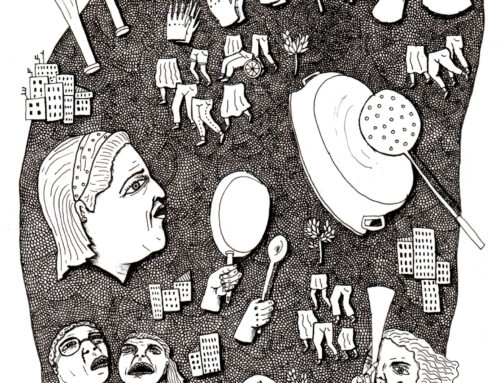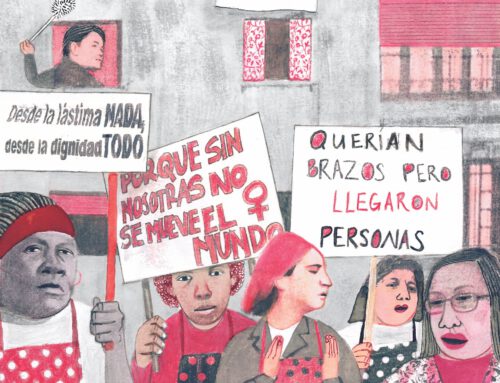Project Description
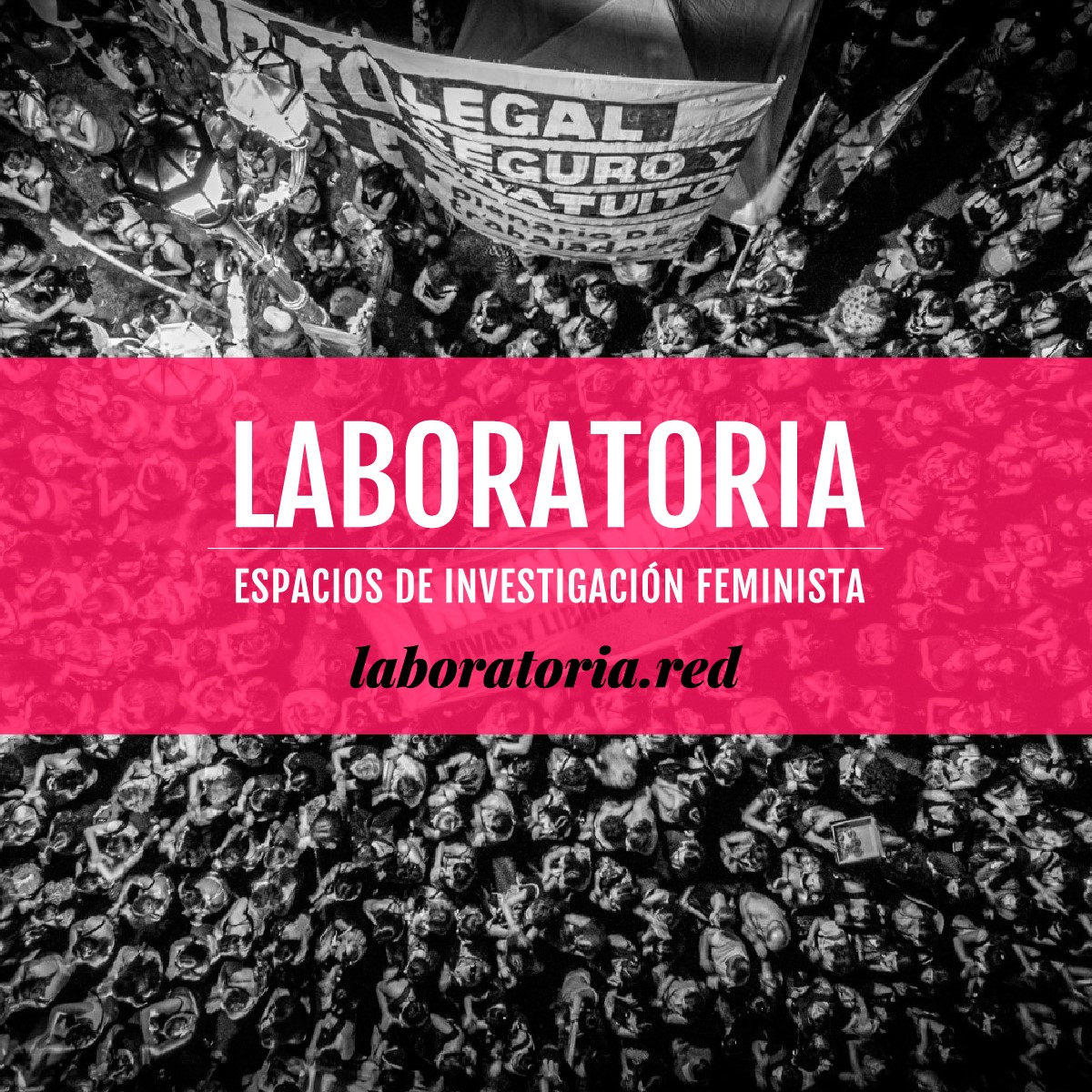 La Laboratoria was born in 2020 in the heat of the international feminist tide, through the fabric of ongoing conversations among feminist activist and thinkers from Latin America, North Africa and Europe focused on situated knowledge and artist production within feminist grassroots.
La Laboratoria was born in 2020 in the heat of the international feminist tide, through the fabric of ongoing conversations among feminist activist and thinkers from Latin America, North Africa and Europe focused on situated knowledge and artist production within feminist grassroots.
Since we began our journey, we have articulated our work around three main lines of action – situated feminist research & co-creation practices, feminist pedagogy, publishing & dissemination. All activities found under these lines of work serve, in their unique way, our goal of becoming, quite literally, a Laboratory for situated thought and creation that circulates as transnationally as the feminist struggles of the last decade themselves.
This memory of activities, written for our English-speaking comrades, should present a brief history of the labor we engaged in during the years 2020–2022, as put forth by the Madrid node and the Transnational Coordination Group of the network. It doesn’t, as of yet, manage to display fully the rich multiplicity of interwoven collective practices and realities taking place in all other local nodes of La Laboratoria (Buenos Aires, Porto Alegre, Quito, NYC) during that timeframe. Some of them are, nonetheless, mentioned in contexts of inter-node collaboration.
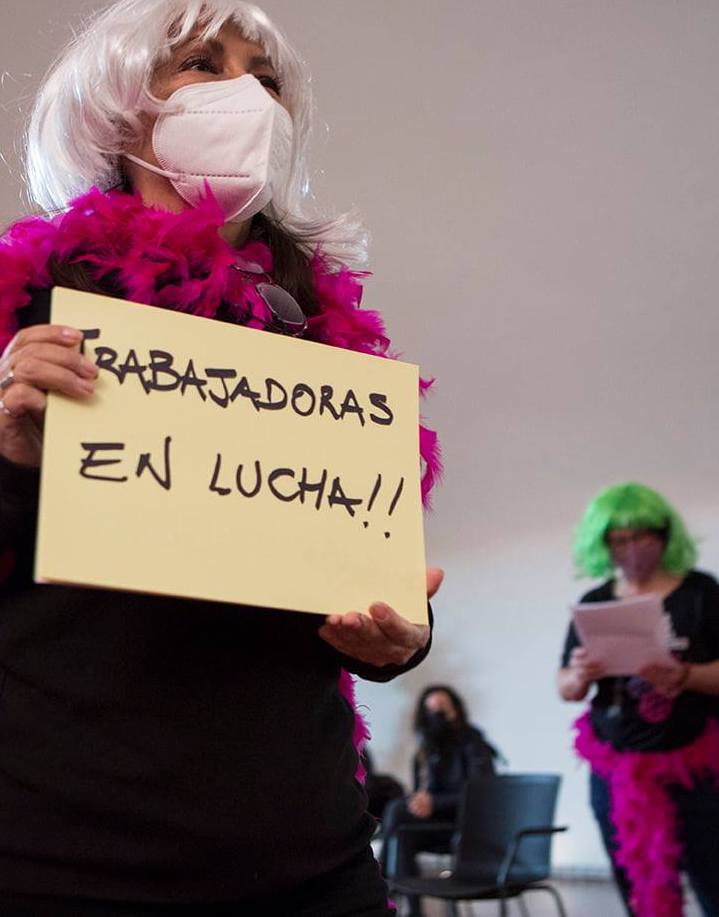
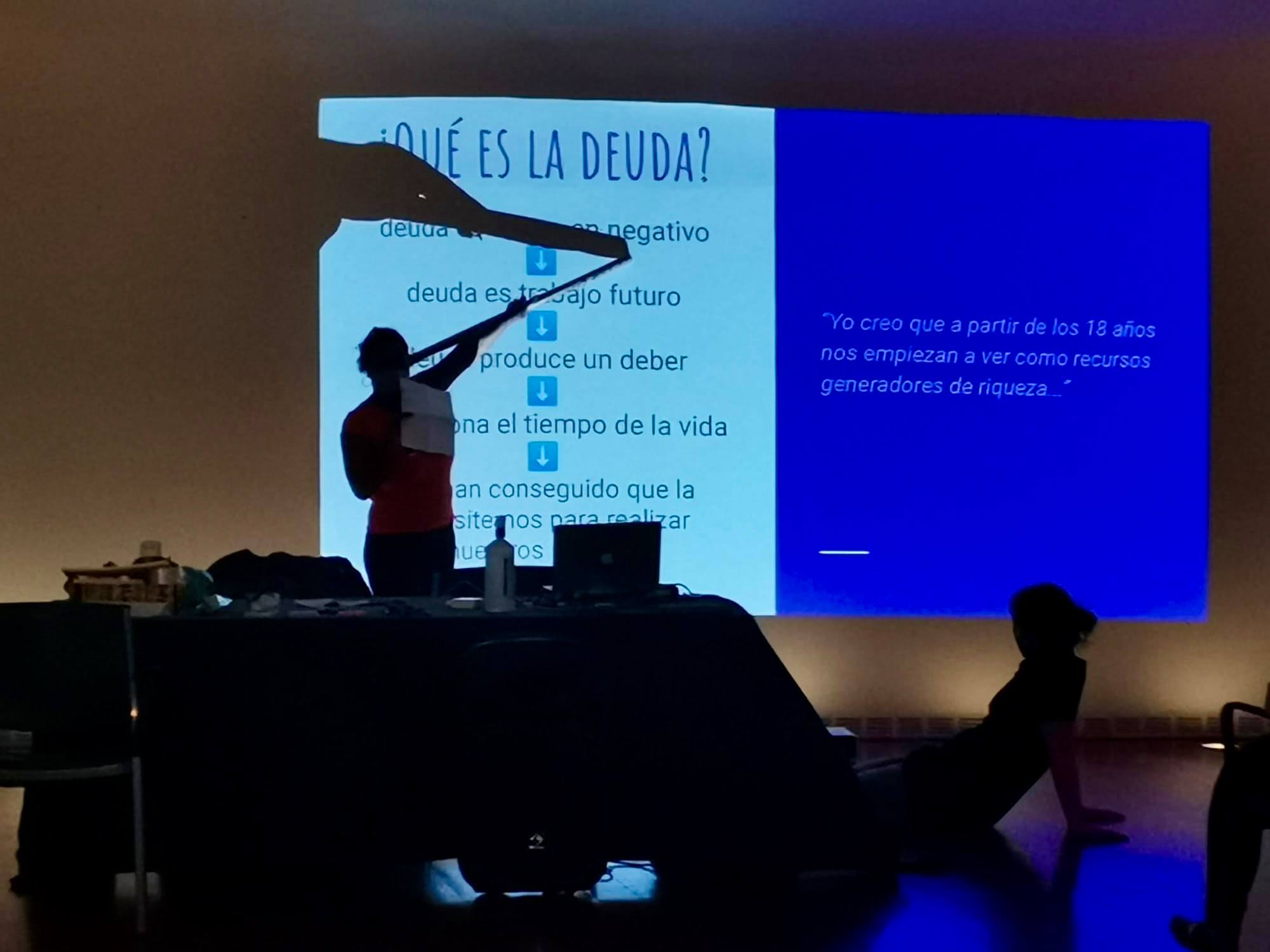
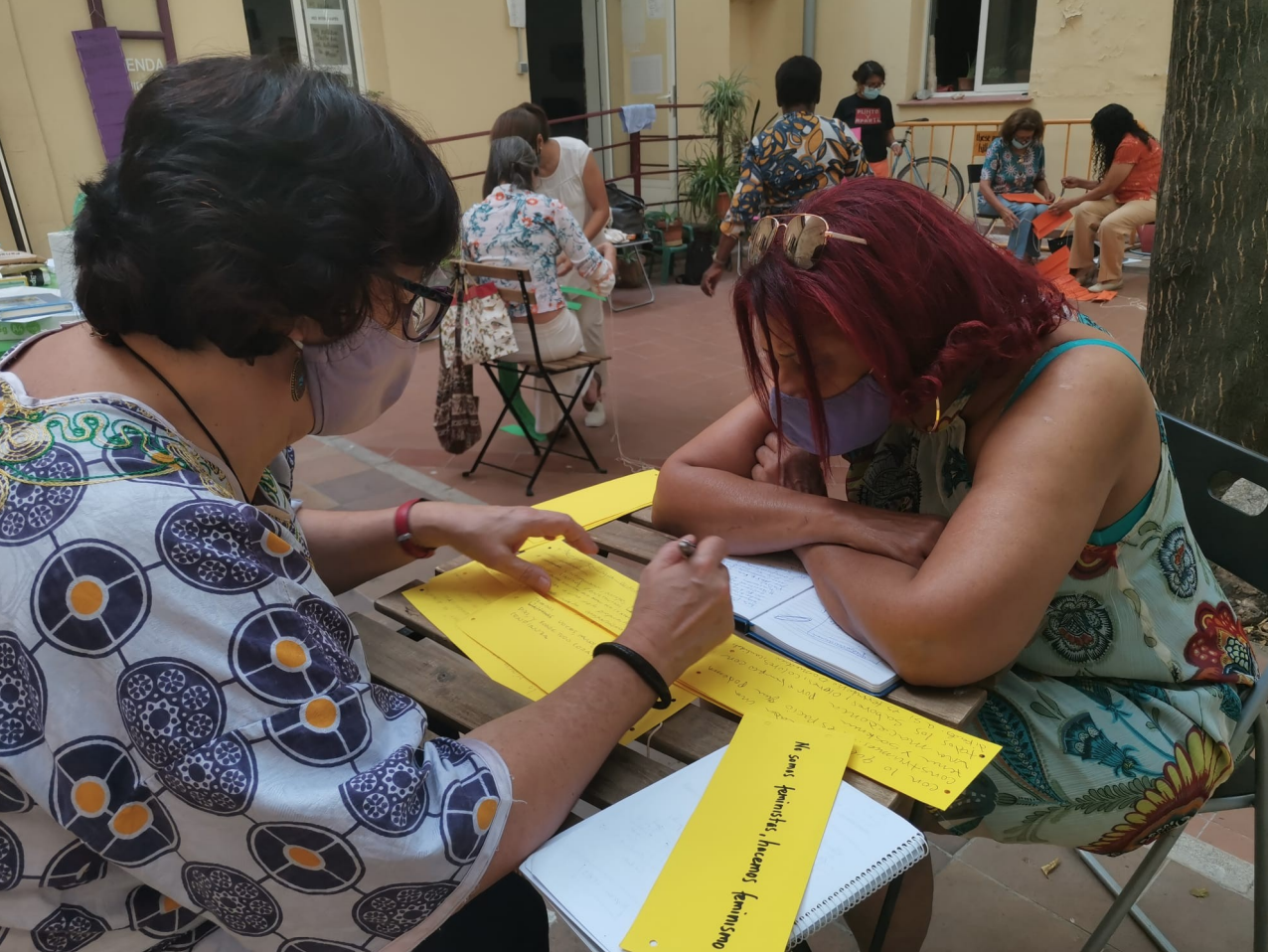
Academic course 2020–2021 at a glance
The year 2020 was a harsh time for everyone in the network, experiencing lockdowns, economic stress, sickness and mourning, as millions of people around the world. Nevertheless, making a virtue out of necessity, we could consolidate our network during the first months of global lockdown, expanding our network further. The active dialogue among the nodes helped elaborate on a common diagnosis of the pandemic and to enrich local activities of each node. We were also able to develop our graphic style, to feed our newly created website with monthly contributions and to open our own YouTube channel and FB, TW and IG accounts, gaining presence in social media.
The Madrid node launched a project of situated research on Feminist unionism that provided research stipends for three groups/activist and developing an intense international program of mentoring and accompanying activities, such as situated thinking workshops, collaborative writing laboratories, mentoring sessions and so forth. Through this program, in which almost 100 people participated all in all, three illustrated booklets were collectively produced, combining personal and collective life stories, strategies for organizing and survival, and inspirations for a better world.
As an outcome of the situated research program on feminist unionism, we produced three booklets:
- “Bio-syndicalism from the Domestic Territories. Our Demands and Our Ways of Doing”, by Rafaela Pimentel, Amalia Caballero, Ana Rojo and Constanza Cisneros in conversations with Territorio Doméstico
- “Until Patriarchy Falls and There is not One More Eviction. Debt, Housing and Patriarchal Violence”, by Lotta Meri Pirita Tenhunen and Myrian Espinoza Minda in conversation with PAH Vallekas’ Women’s Group
- “From Farm-Work to Care-Work. Towards a Feminist and Anti-racist Syndicalism”, by Pastora Filigrana.
The production process and public presentations of the booklets were in themselves full of rich possibilities to produce common notions and forge political alliances between different sectors of feminist struggle. Some of the workshops that were organized within this framework to help merge knowledge were “Politicizing the pots, the streets and the aprons” by Territorio Doméstico or “Debt as extractivist mechanism of our living power” by Tenhunen and Minda. Since their publication, the booklets have served as material to workshops and readings in numerous places and contexts both in Spain and abroad. The first edition of Territorio Doméstico’s booklet soon ran out of copies and made us start planning for a second one!
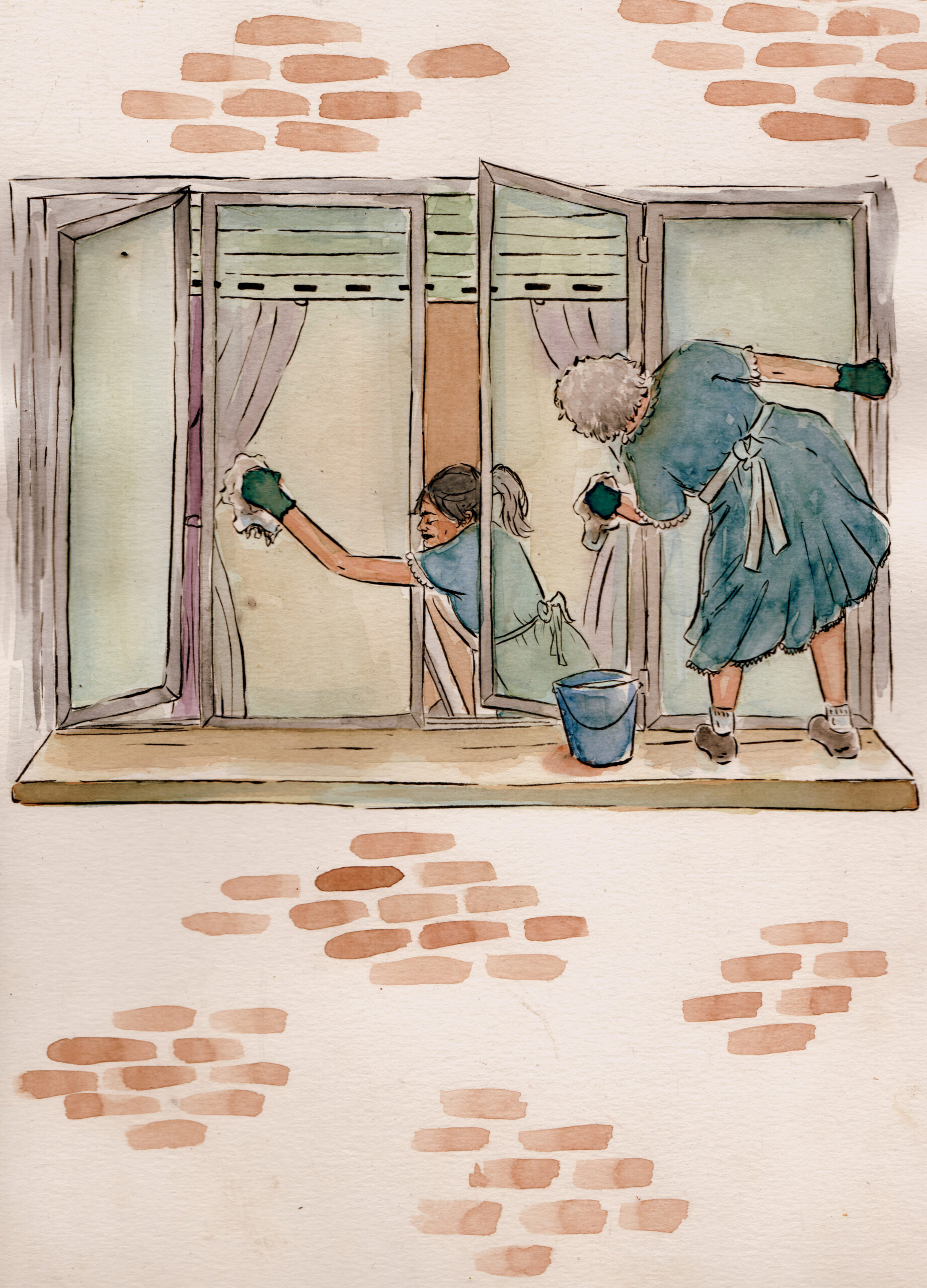
Illustration by Cynthia Veneno
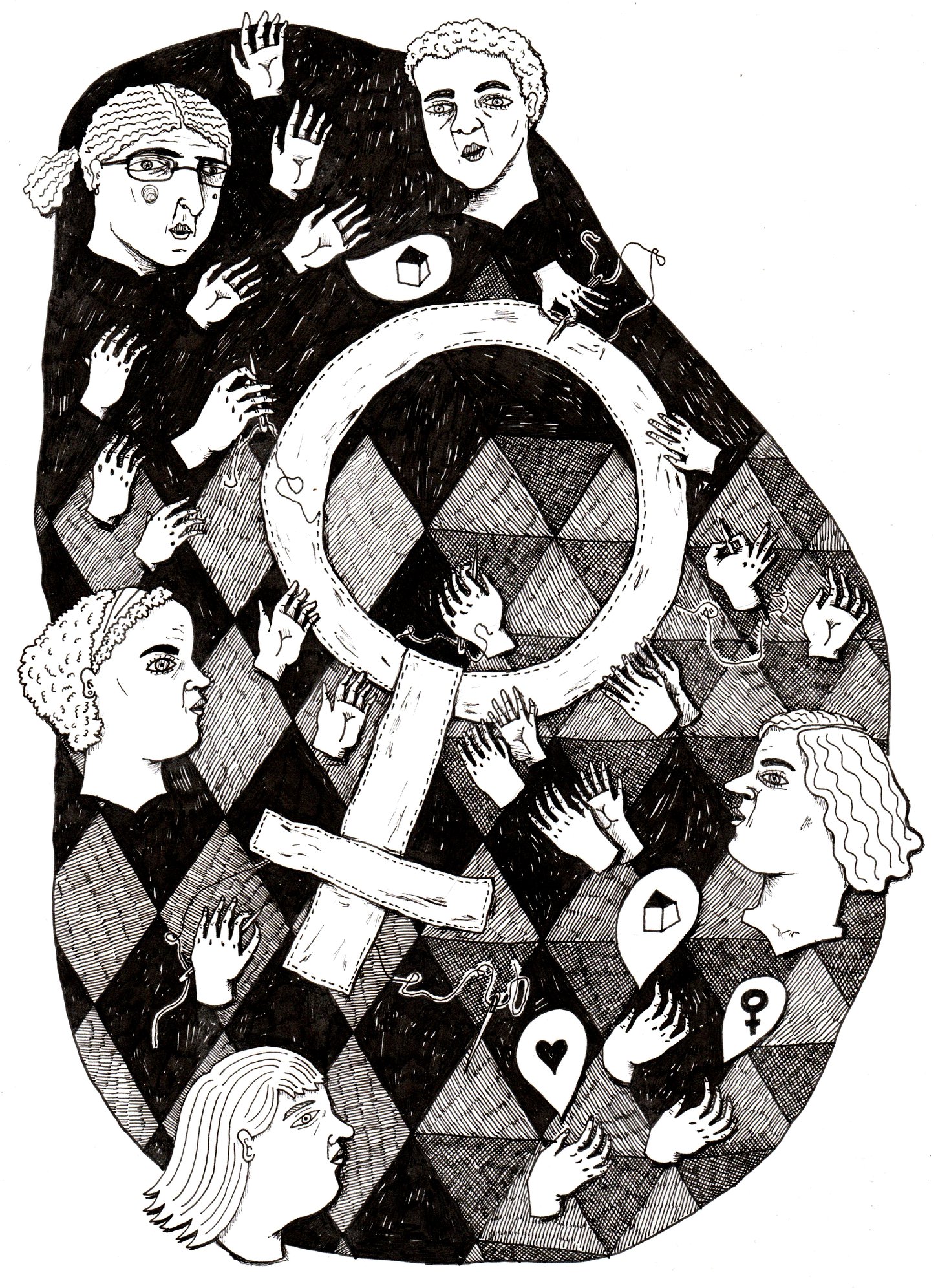
Illustration by Coco Guzmán
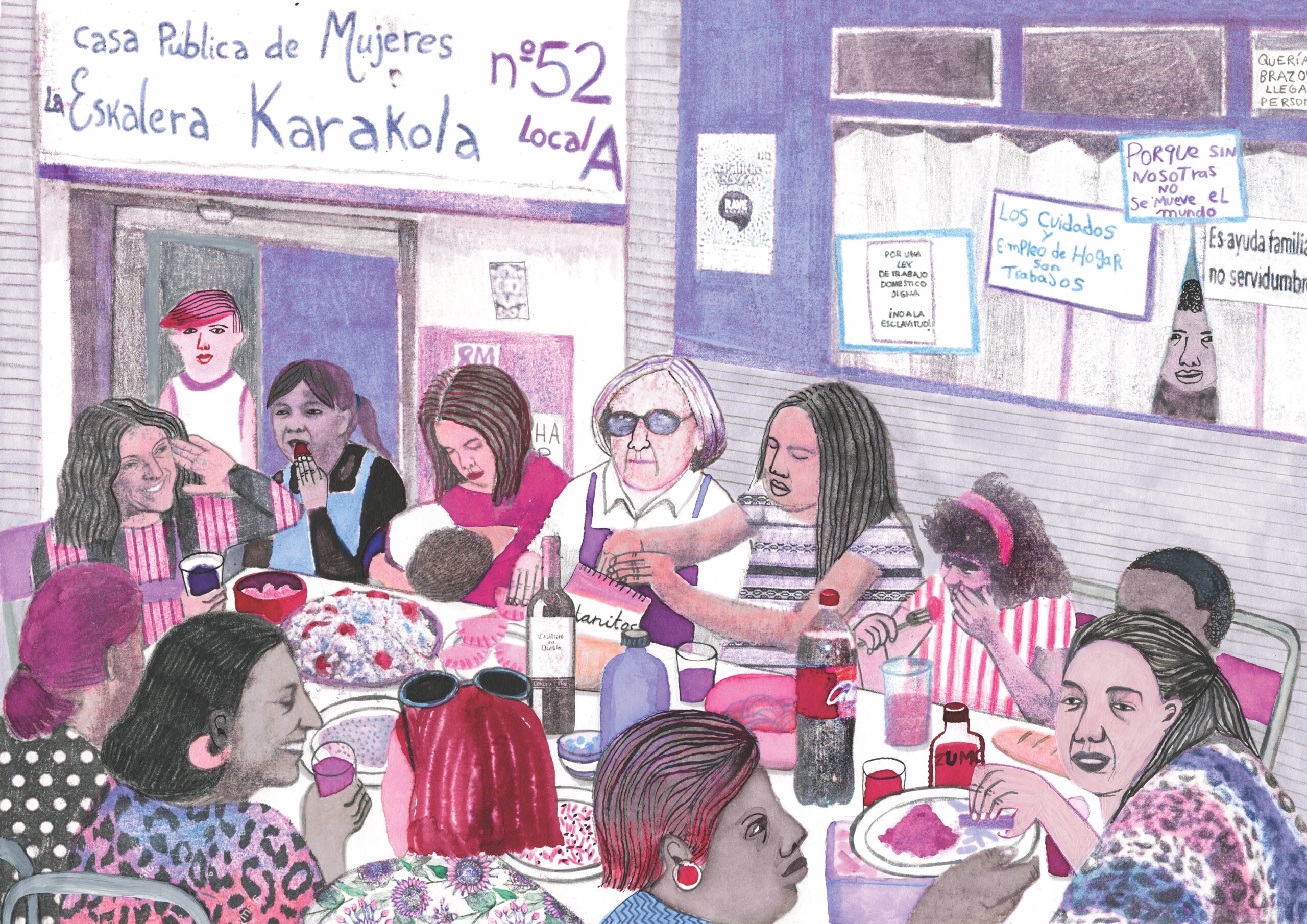
Illustration by Ana Peñas
The illustration of the booklets played an important role in the process as well as in the outcome. Artists Ana Peñas, Coco Guzmán and Cynthia Veneno illustrated their respective booklet each, adding a fundamental element without which the final booklets wouldn’t be the same. While the booklets were written in Spanish, we are working on their initially partial and hopefully, eventually, complete translation to English. Filigrana’s bookslet’s introduction chapter is already available on our website, courtesy of Common Ecologies.
Closely connected, we organized a four day encounter that took place both online (internationally) and face-to-face (in Madrid): “The Unionist Feminism to Come. We Are All Workers!” A total of 15 grassroots organizations from feminized and migrant sectors were involved in its design. The meeting was very much welcomed – it’s registration was complete the same morning it was opened. The average number of attendees was 50 people, maximum capacity during the context of Covid19 pandemic, filling the event space day after day. Online participation was 150 people on average, reaching 217 people in the opening lecture. Throughout the different round tables, 25 women speakers shared fine analyzes on the specific modes of exploitation and dispossession in their sectors, as well as self-organization and struggle strategies. The quality of the content was laying the foundations for a very moving final assembly. The icing on the encounter, the first face-to-face one for feminist activism after many months of lockdown, was a live performance by Territorio Doméstico.
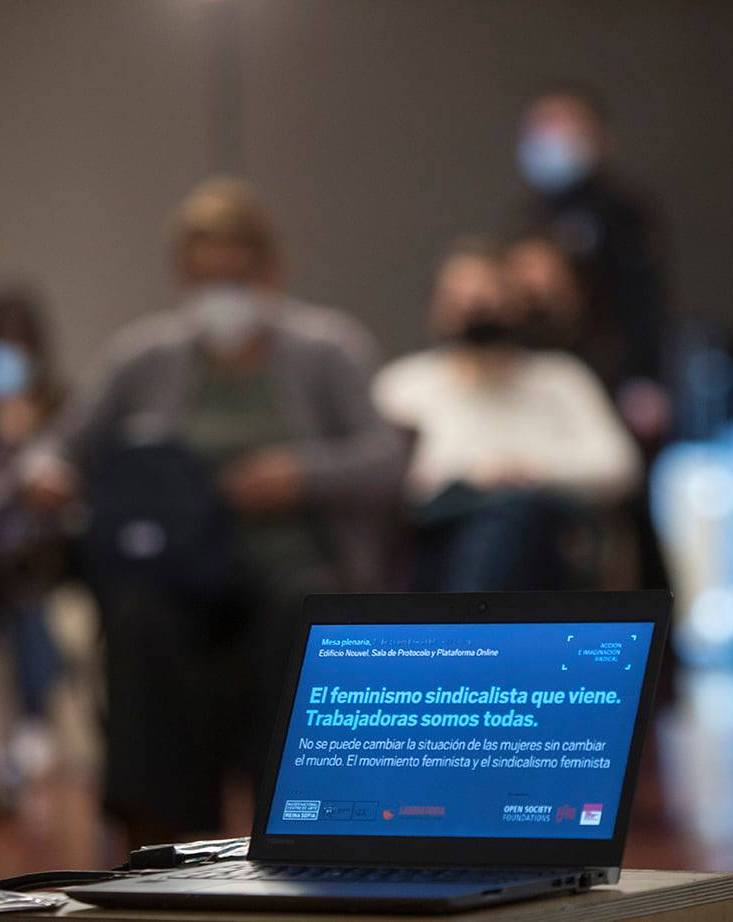
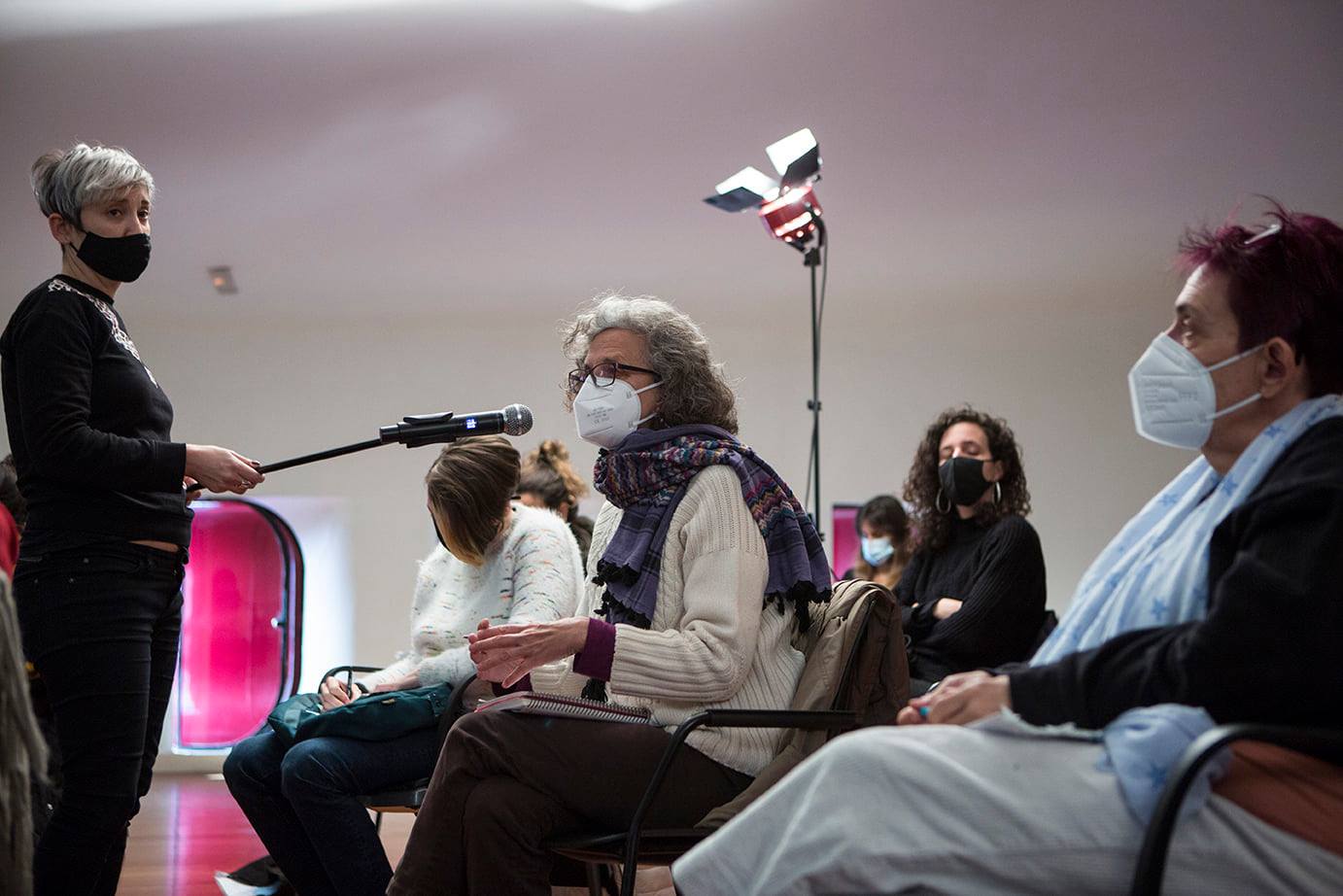
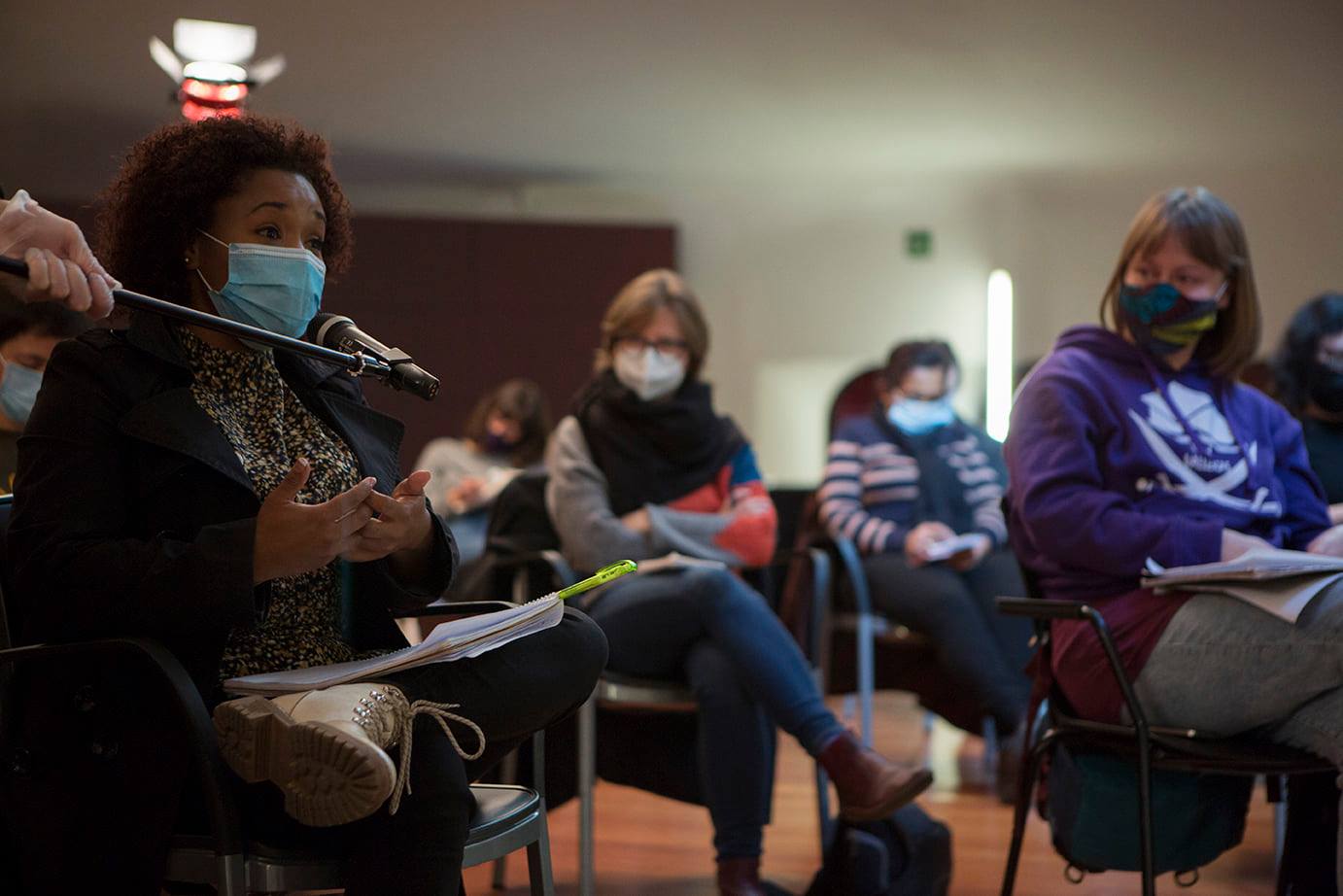
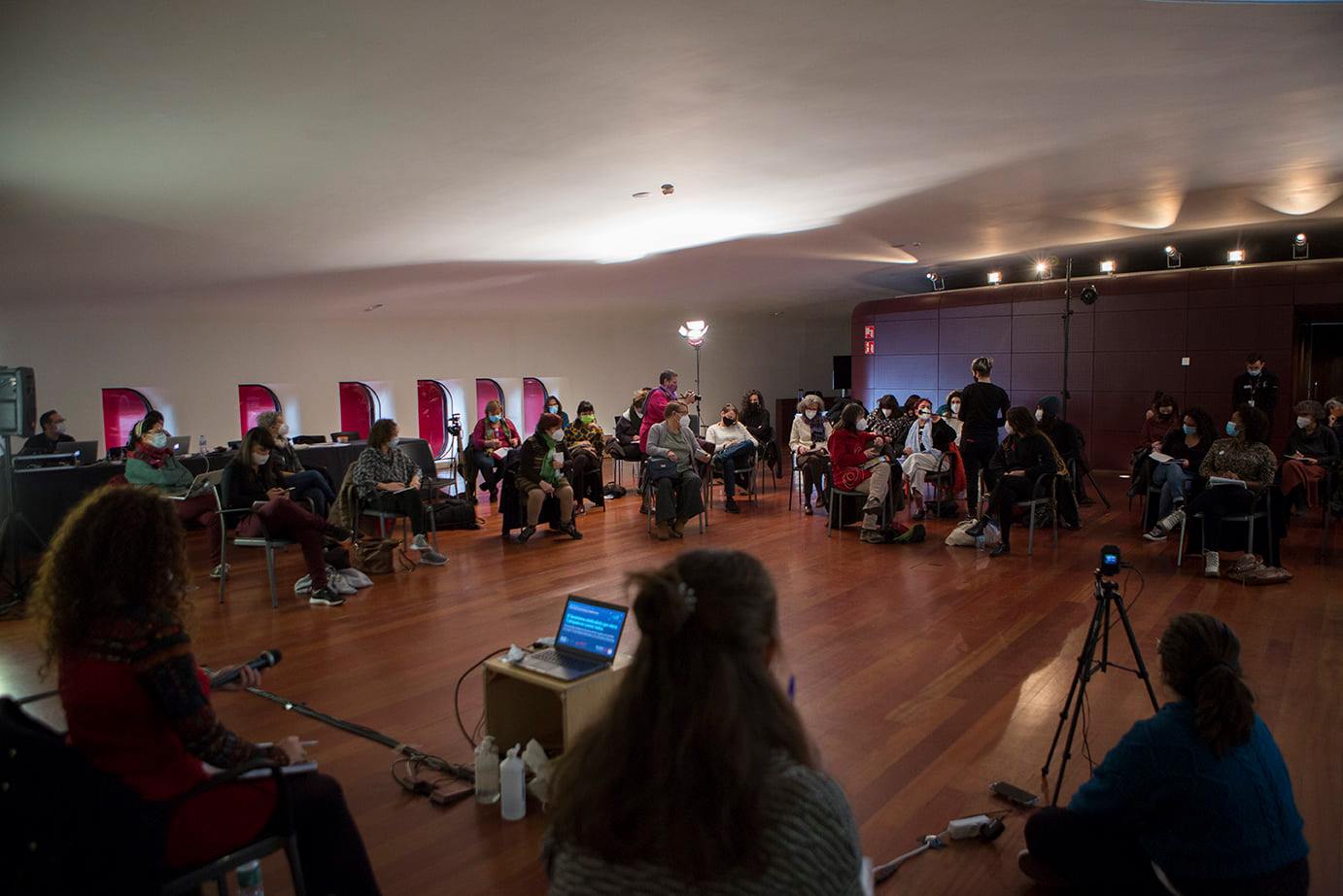
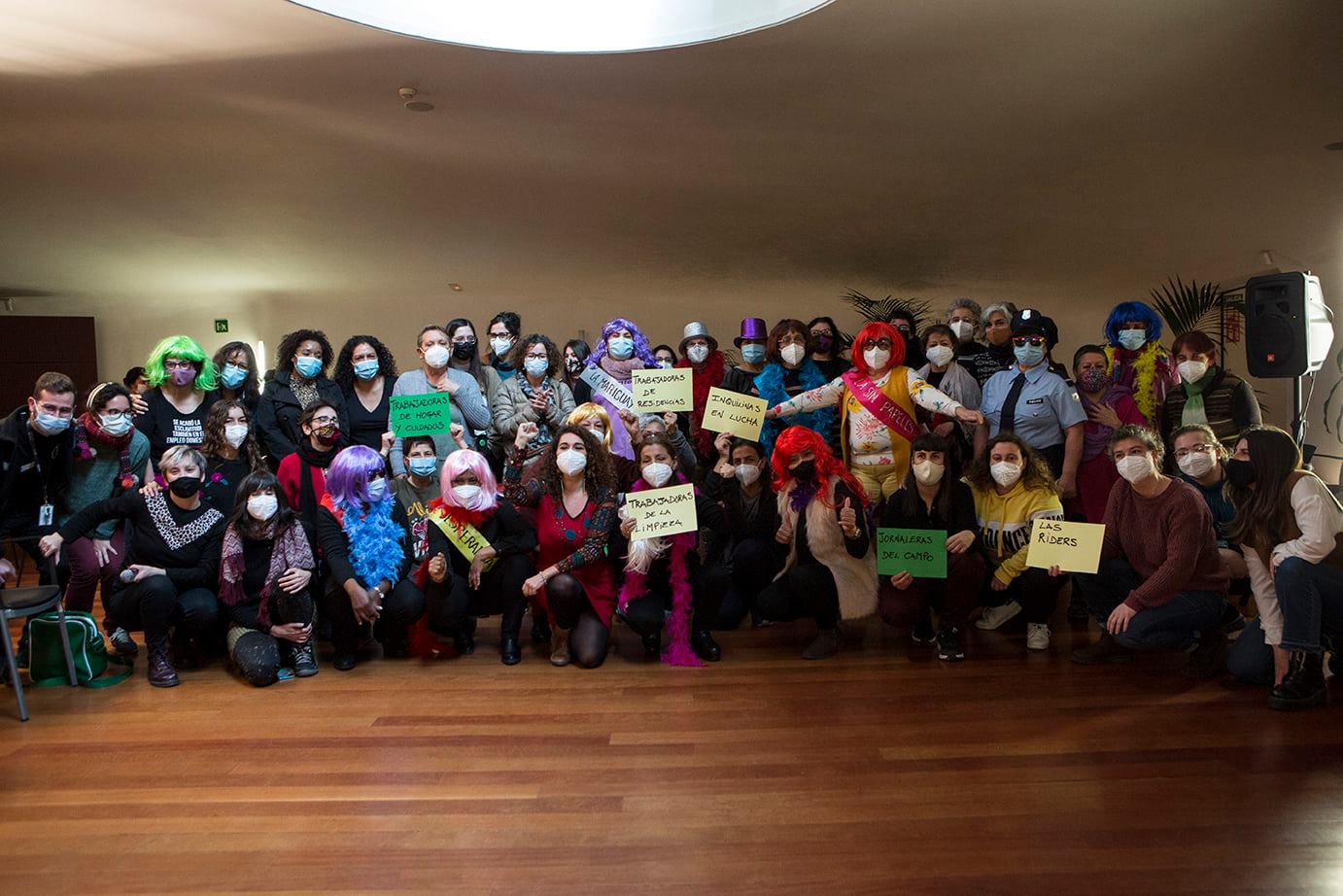
Photos by Elvira Megías
Due to Covid19 restrictions, we had to postpone two planned study trips to Morocco and Argentina. We organized a set of activities putting in conversation feminist thinkers in Morocco with Moroccan women in Cañada Real (a slum in the periphery of Madrid) active in a struggle for access to electricity, Moroccan and Spanish female strawberry laborers in Huelva and other feminist & syndicalist activist in Spain instead. We crisscrossed these activities with the exhibition at Museo Reina Sofía Moroccan Trilogy 1950-2020, which articulates a visual dialogue that reflects artistic production at three historical moments from independence to the present day. This was another way to travel to Morocco: the Moroccan reality which lives within and through Spain.
Our second study trip was to the strawberry fields in Huelva: the Feminist Observer Brigade Open the Gates! With the aim of documenting and granting visibility to the work and living situation of numerous female day laborers, both local and seasonal or undocumented migrant workers, we organized a Brigade composed of feminist lawyers, journalists, and artists. Under the guidance of Abogadas Sociedad Cooperativa Andaluza (the Andalusian Cooperative of Women Lawyers) and Asociación de Jornaleras de Huelva en Lucha (the Association for the Struggles of Female Day Laborers in Huelva), the group went over crop fields, towns, and informal settlements to learn first-hand and analyze from different perspectives — legal, journalistic, sensitive — the overlapping elements in today’s agricultural production. As an output of the Brigade a legal report was written. A video documentary and a set of sound pieces by Isabel Cadenas and Quepo were publicly presented in a resounding event at Museo Reina Sofía.

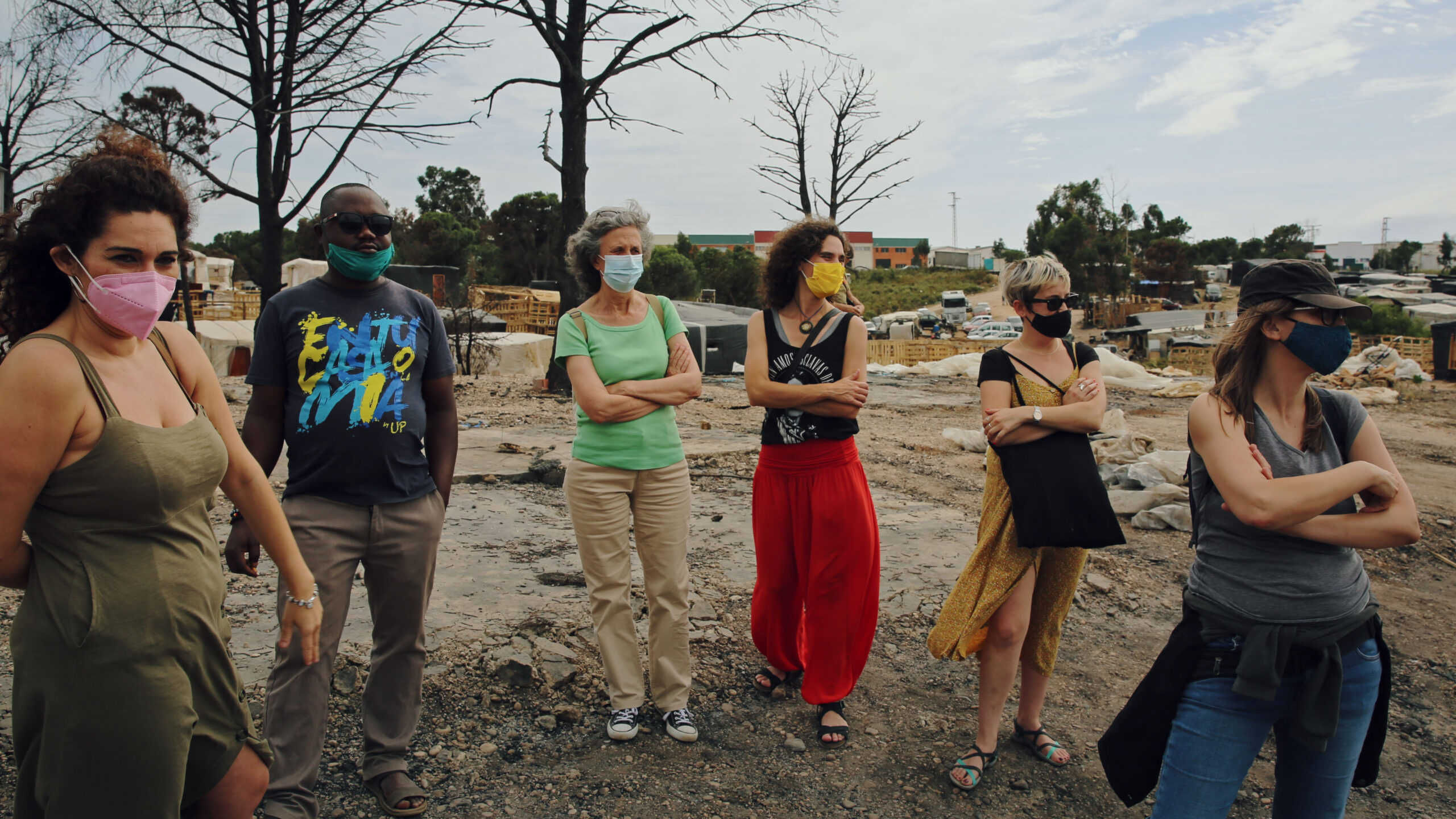
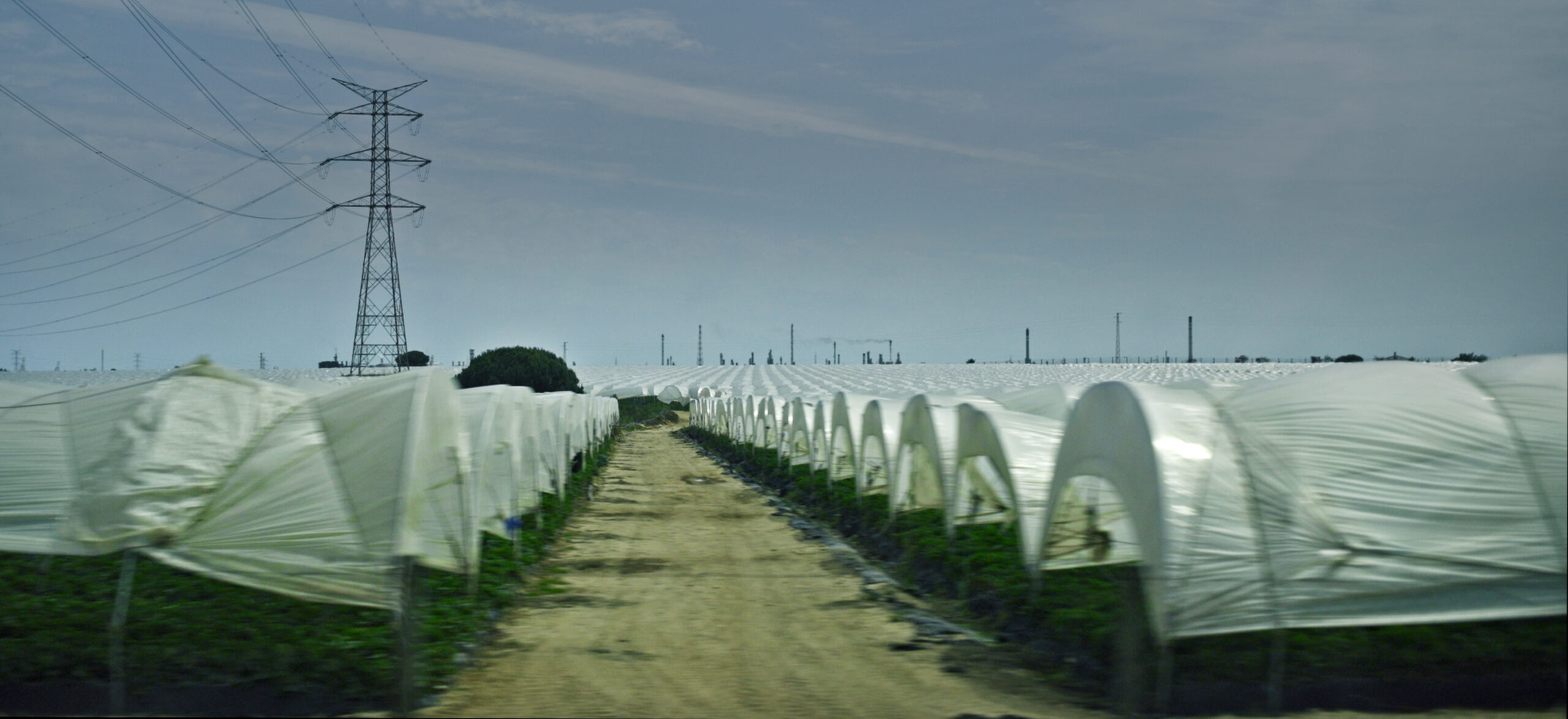
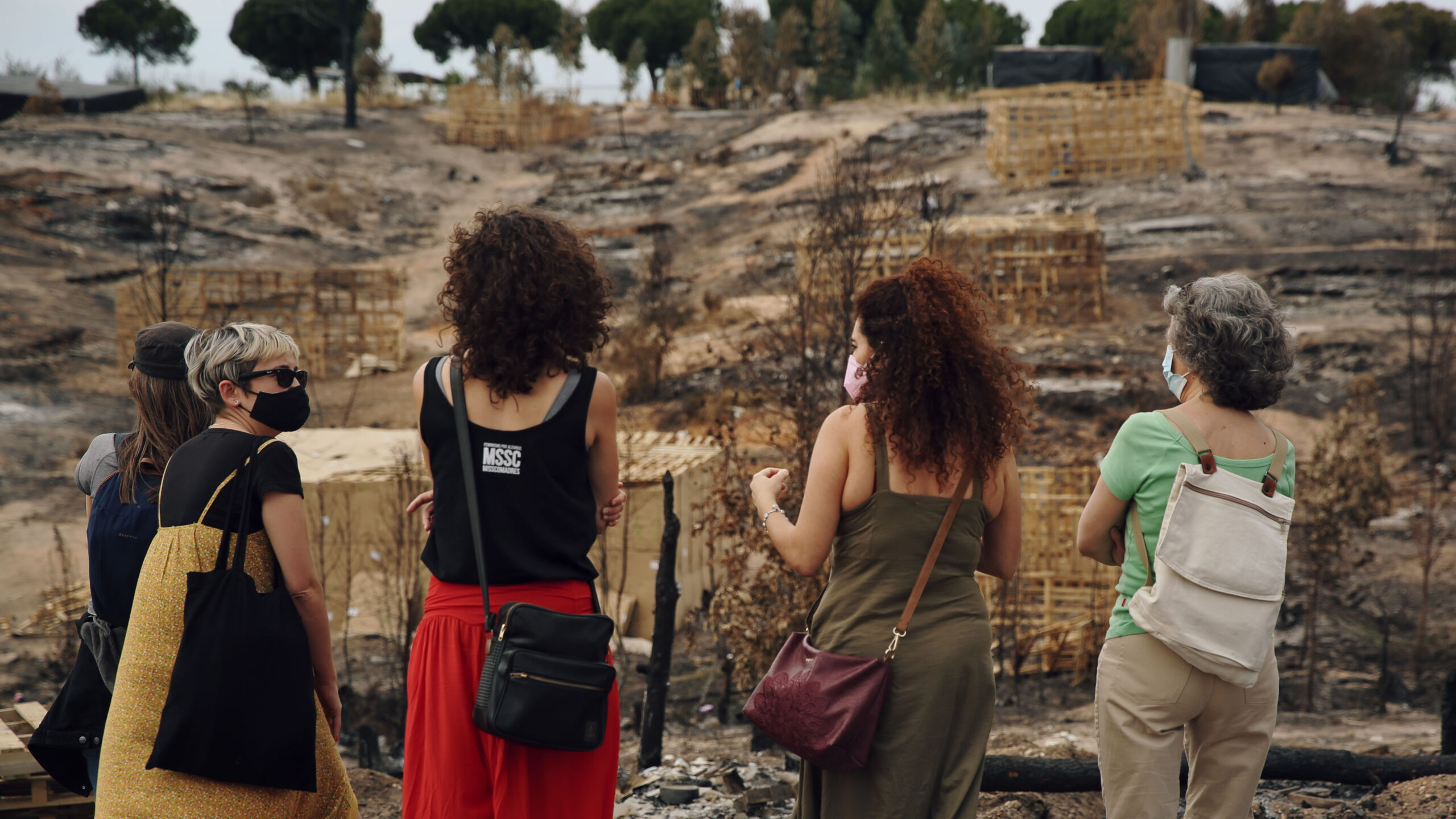
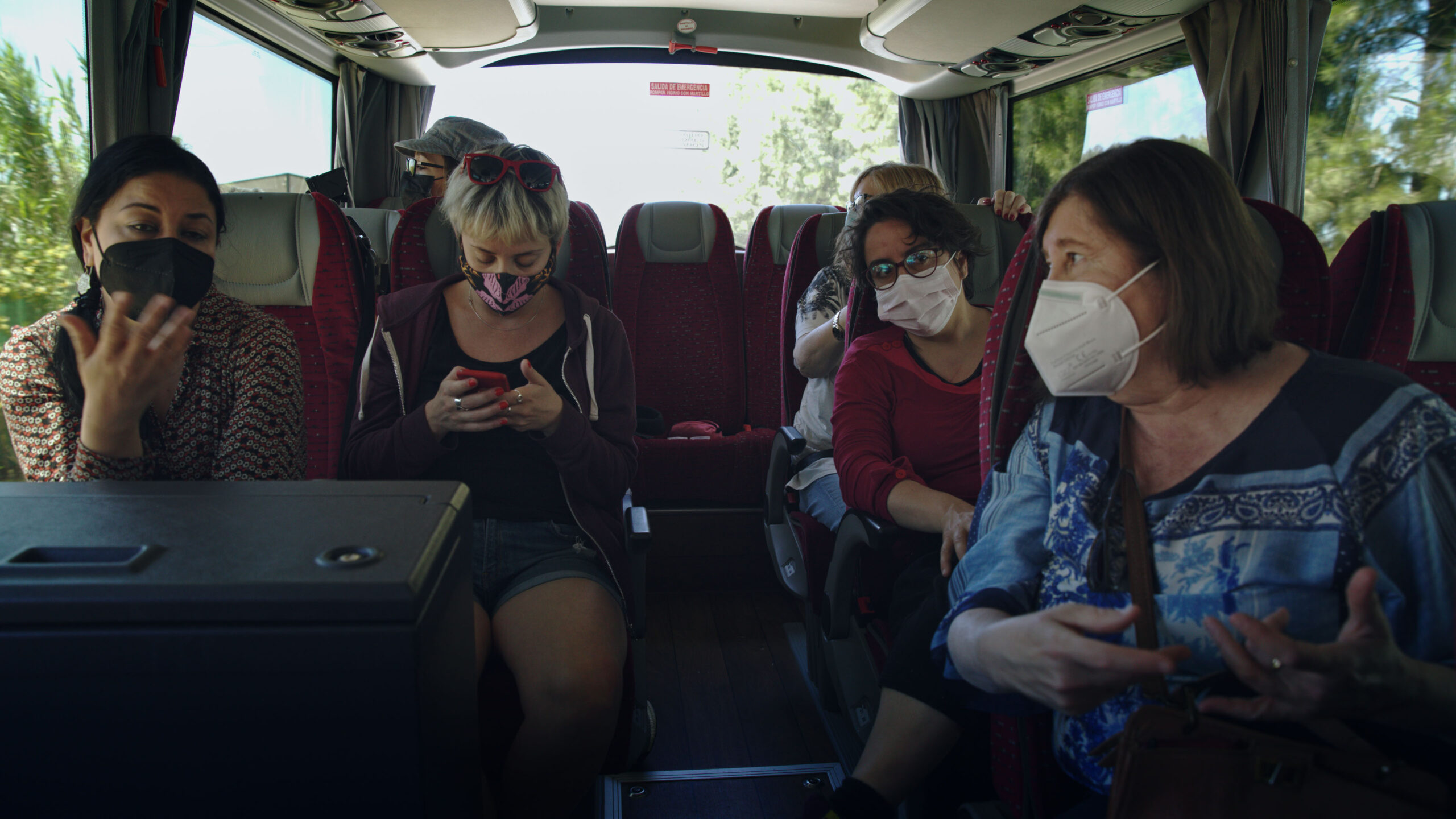
All photos by Quepo
Throughout this difficult year, we strengthened our collaboration with different institutions, which supported several of our activities –Museo Nacional Centro de Arte Reina Sofía, OSIFE, Rosa Luxemburg Stiftung, Foundation for Arts Initiatives–, as well as other international feminist and eco-social research projects in Europe, Latin America, and Morocco, such as Observatorio de las Plataformas Quito, In/Movilidad en las Américas, Carro de Combate, Revista Amazonas, Terra!, Desinformémonos and Association Forum des Femmes Au Rif (AFFA RIF).
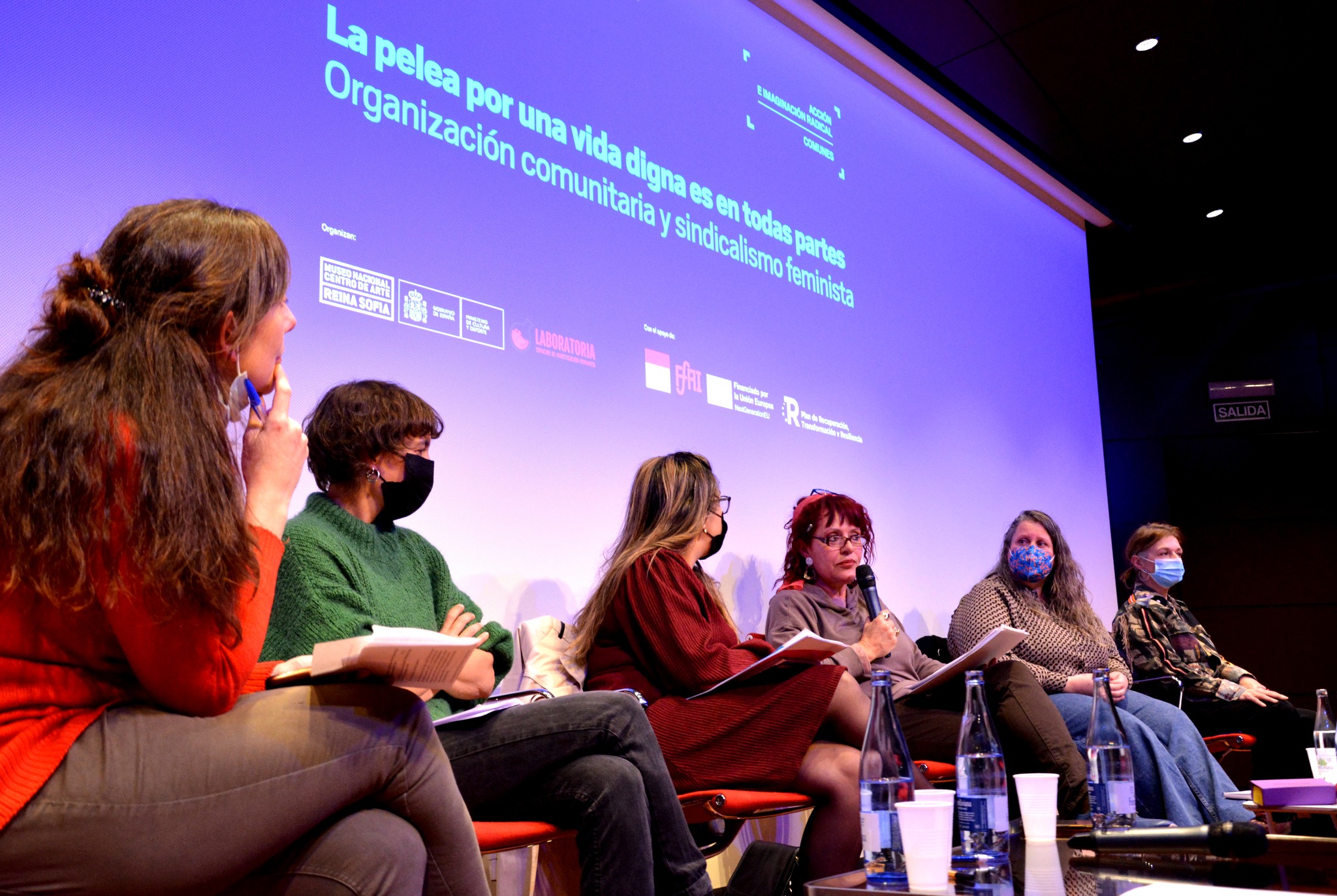
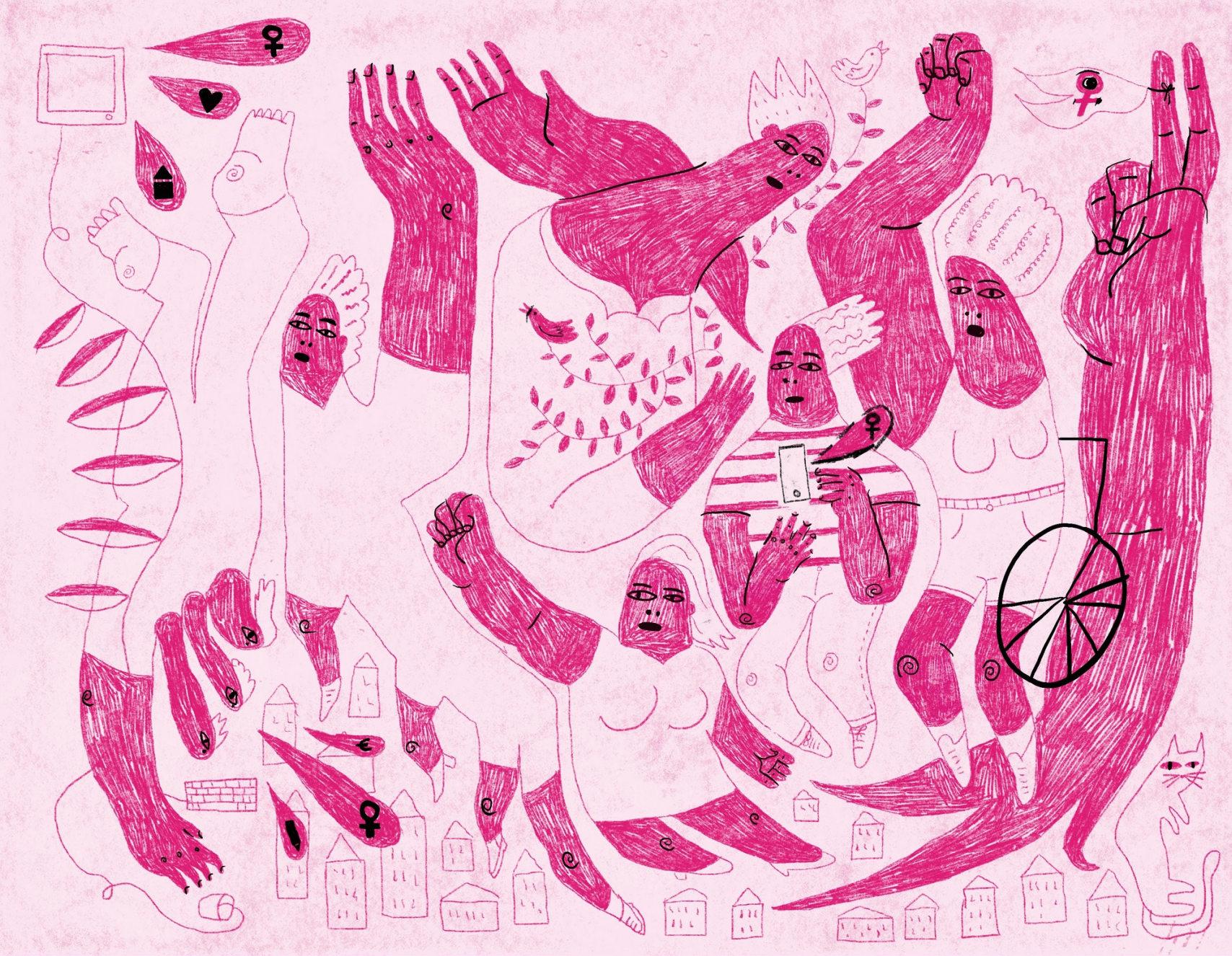
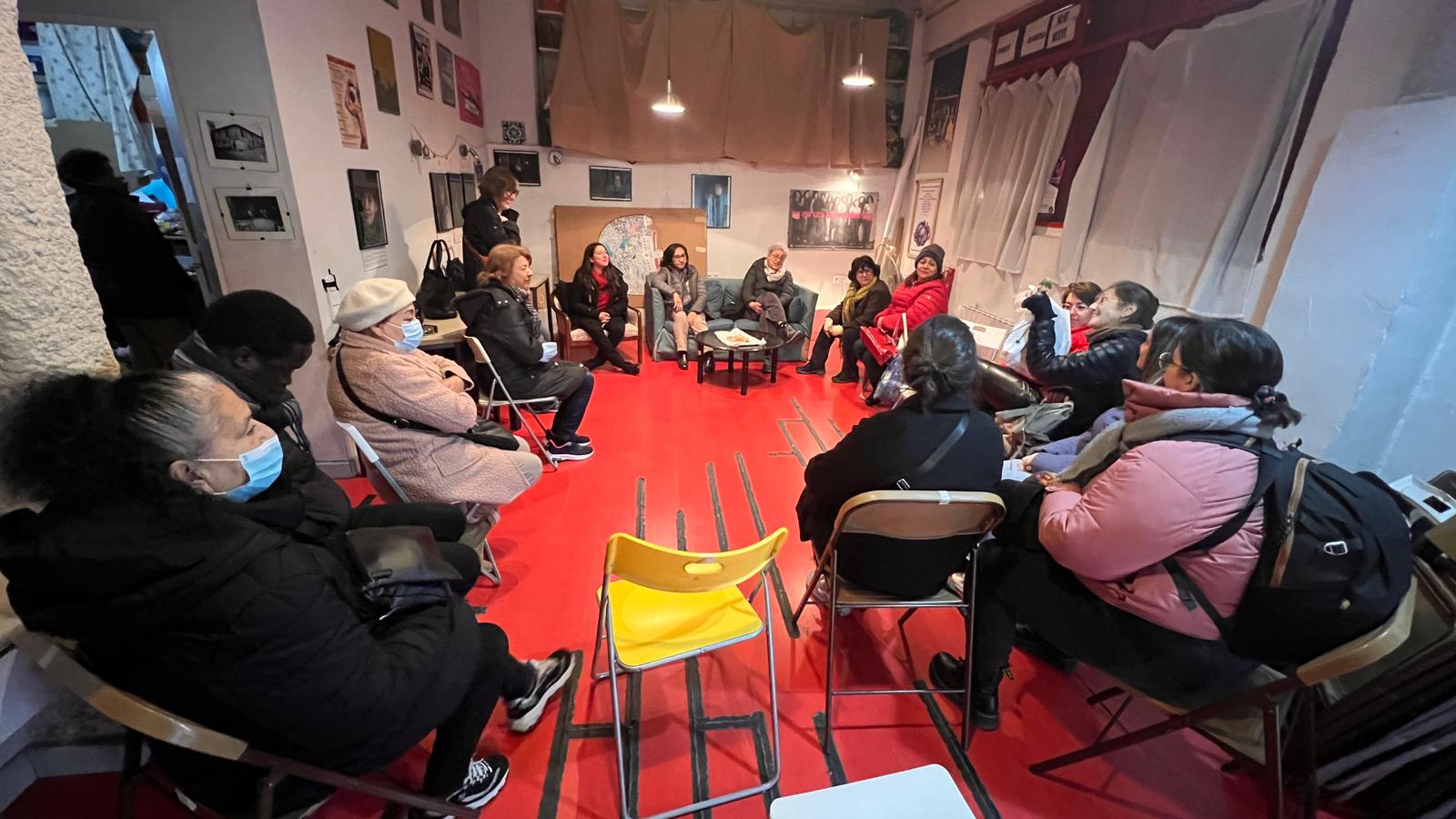
Academic course 2021–2022 at a glance
This year war broke out in Europe renewing a context of a global nuclear threat. In the meanwhile, we witnessed a terrible intensification of other forms of war, such as the deadly border control on both the European and American continents. We suffered reactive setbacks on legislation regarding bodily autonomy such as the US abortion bill and multiple bans on gender-affirming health care. Yet we kept on organizing mutual aid, producing knowledge, and defending cultural diversity from the feminist grassroots amidst protests and strikes stemming from deepening resource shortage.
We continued exploring our three main lines of action, both locally and transnationally and consolidated our transnational organization, our public presence, and our institutional relations with our collaborators and financing entities. This permitted us to both organize a second edition of the Encounter for Feminist Unionism and renew our situated research program and grant four new stipends to activists/collectives to practice inquiry and write about their struggle and organizational tools while we accompany the process and publishing.
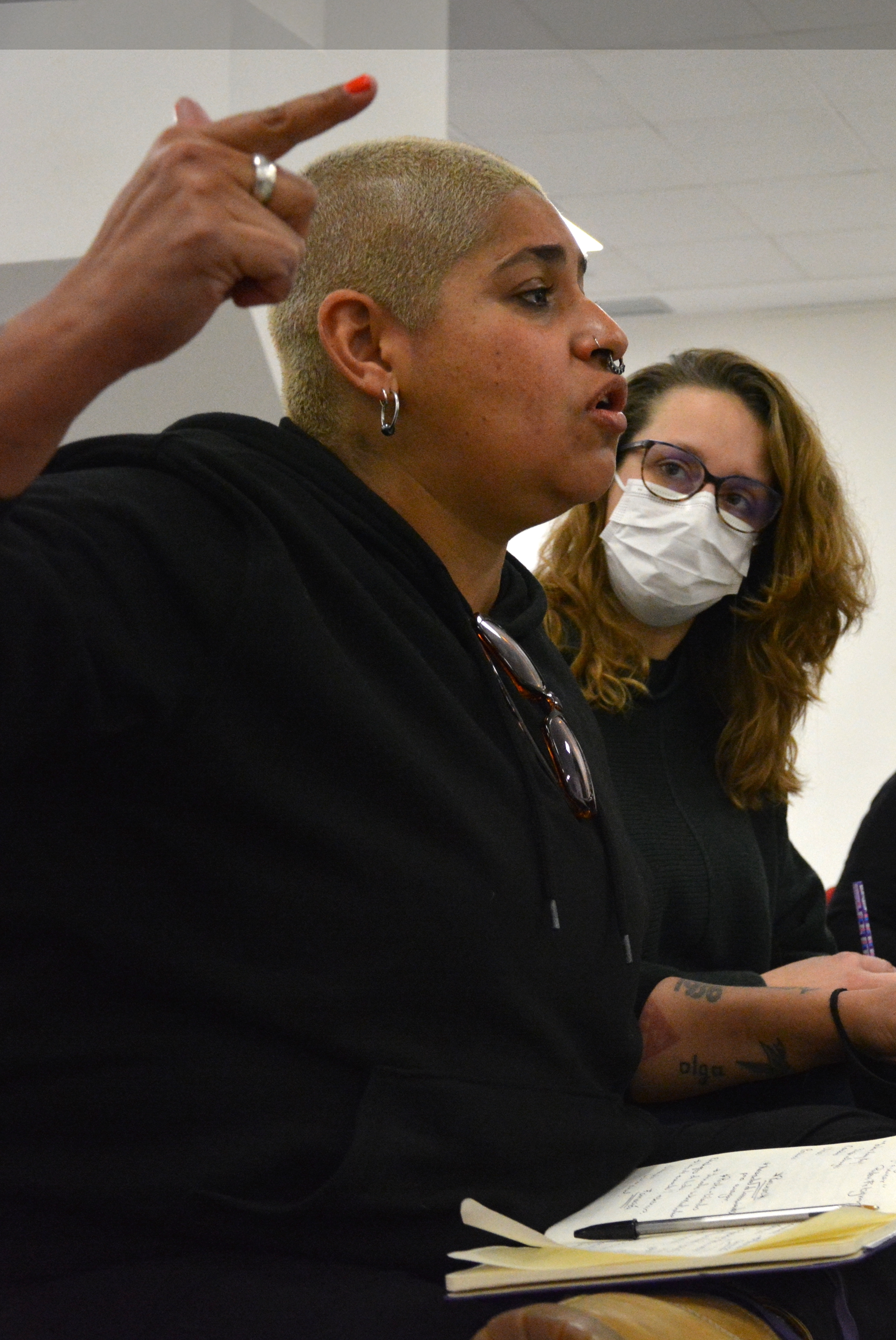
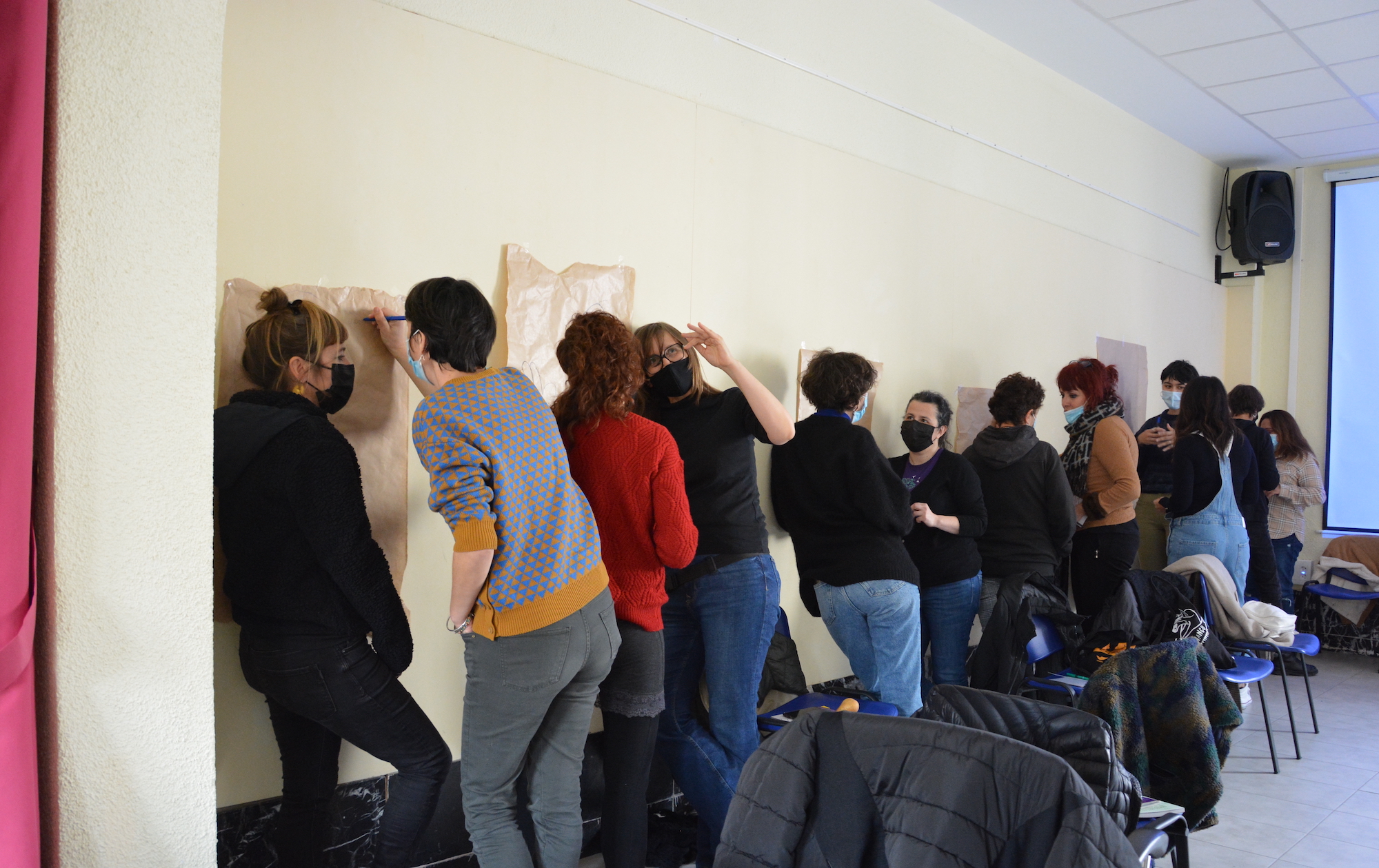
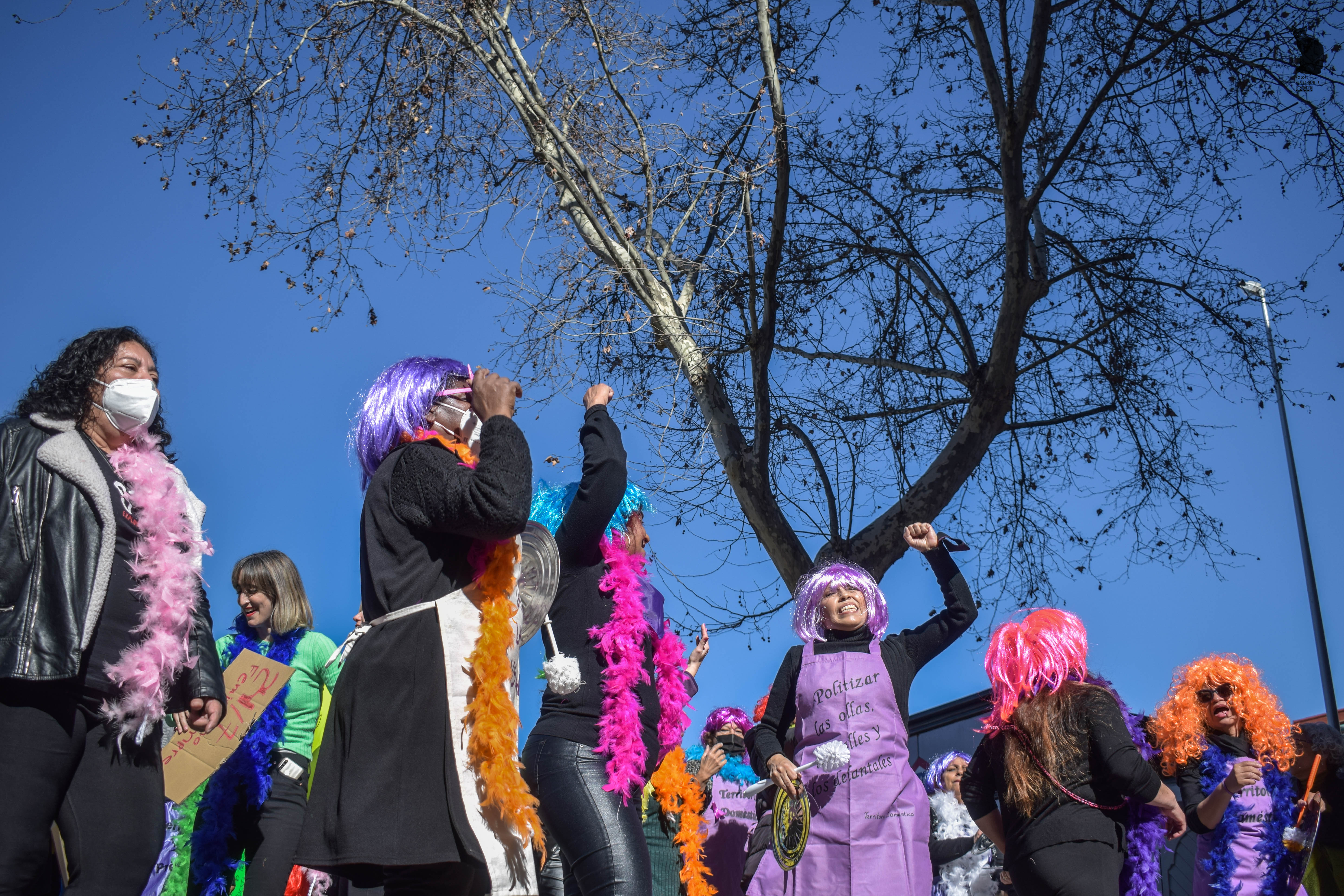
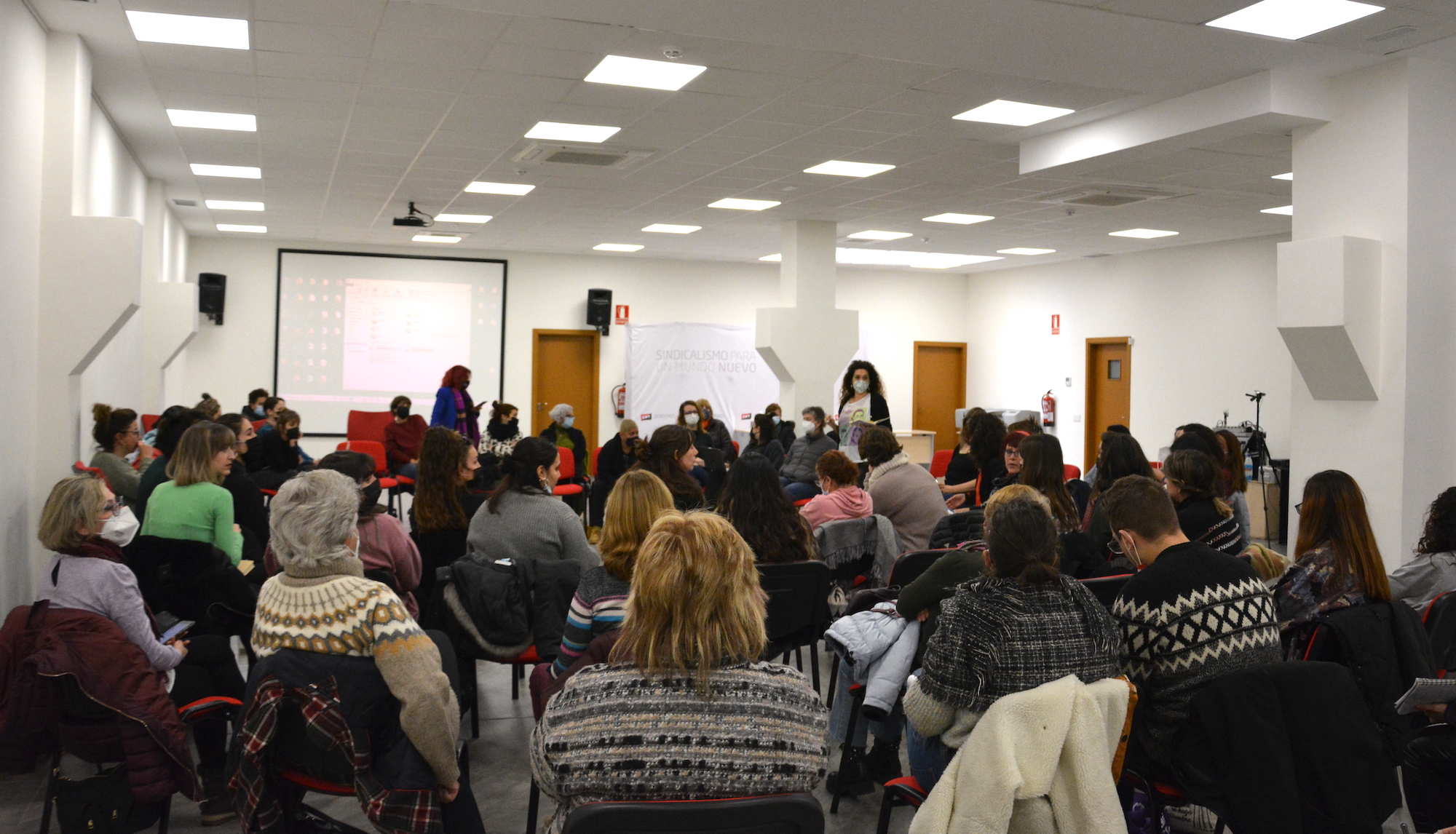
Flash mob photo by Ela Rabasco. Other photos by Lotta Tenhunen
The encounter “To Organize is to Start Winning. Second Encounter for Syndicalist Feminism” was a 5-day event organized internationally (online) and face-to-face (in Madrid) with invitees from all over the Spanish state, as well as international speakers from both South and North America. The public round tables of the event were recorded and made available publicly. The design of this second combined three days of online and face-to-face public round tables and two days of a Small School of Feminist Unionism – a new format that responded to an organizational need that arose after the first encounter. Within the School, practical workshops were organized on different aspects of traditional and novel forms of union work from a feminist point of view, as well as on unionism understood in broader terms as an organization in defense of life and its conditions.
Planning with such precise knowledge about the needs of the assistants was possible thanks to the previous mapping done through an inquiry. Conducted by Beatriz García and Jessica Siham during the summer and autumn of 2021, the inquiry delved into the contemporary forms of unionism as perceived by feminists organizing within or independently from the existing union structures. The inquiry verified the power of their own narration of their struggles (accumulated knowledge, forms of self-organization, virtuous alliances, and blockades of all kinds) as inspiring and compositional examples for many other struggles. It also permitted to include in the ongoing political dialogue of union members with whom there was no time to establish a relationship in the first encounter, and whose experience was profoundly interesting.
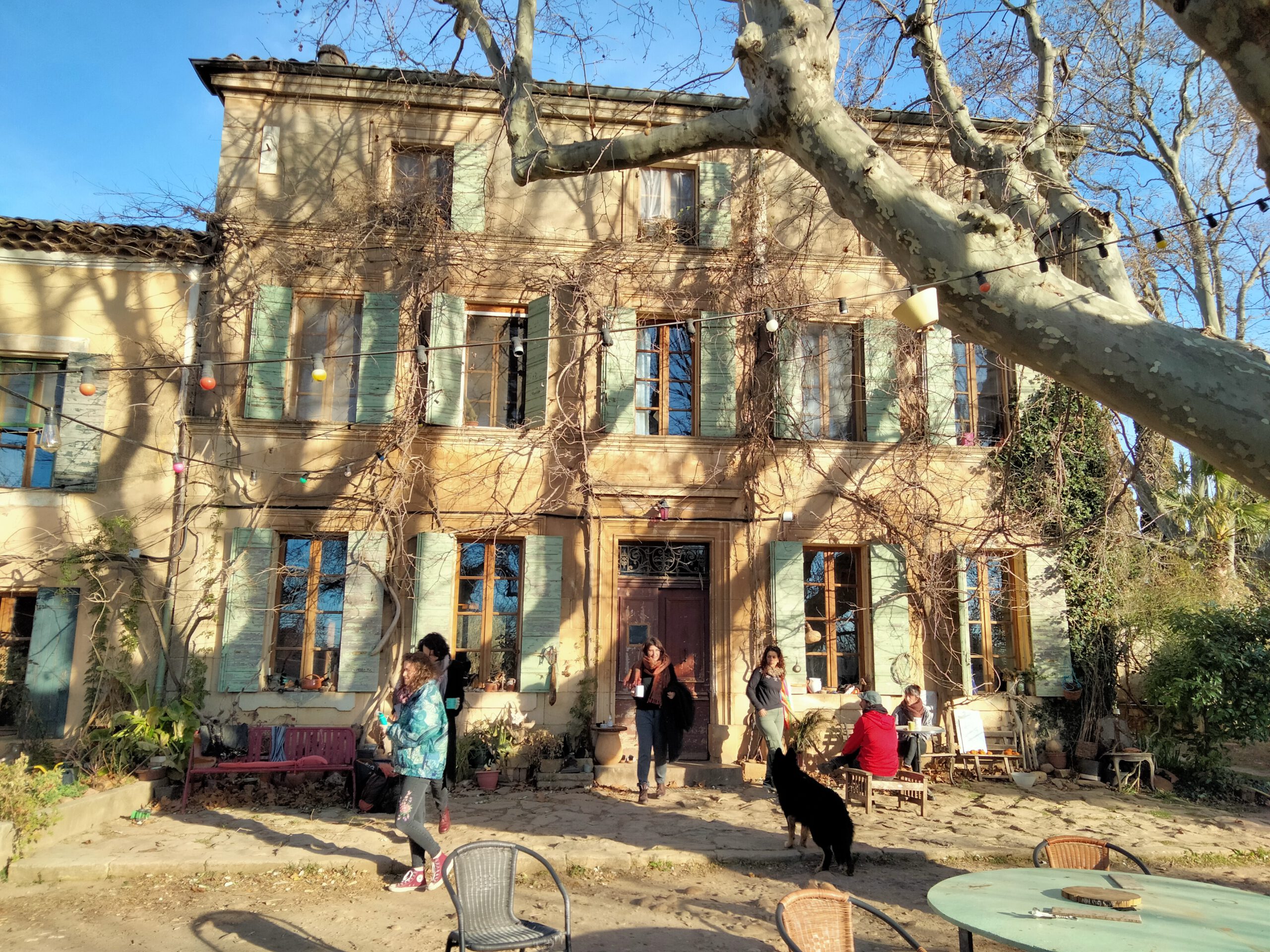
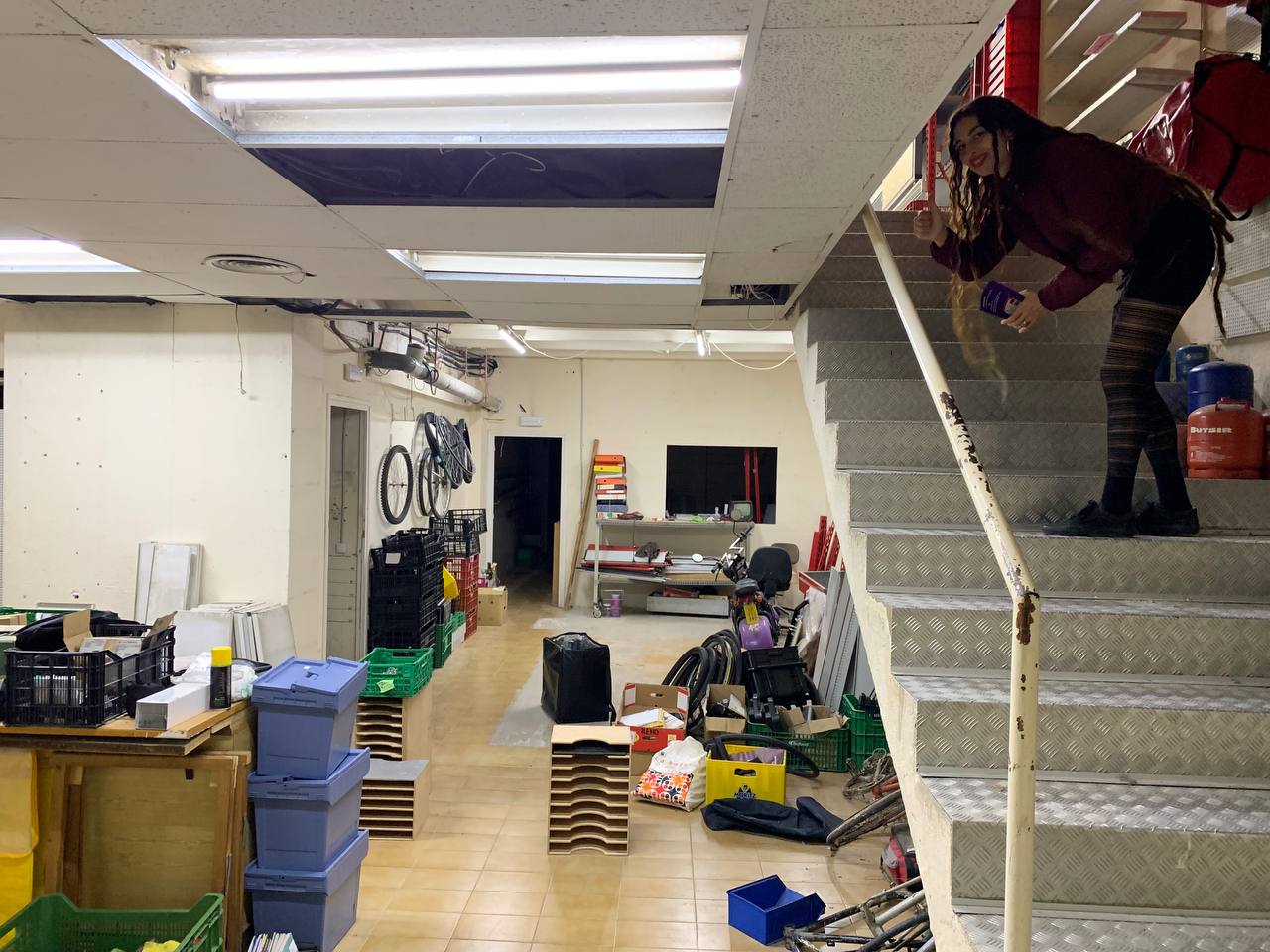
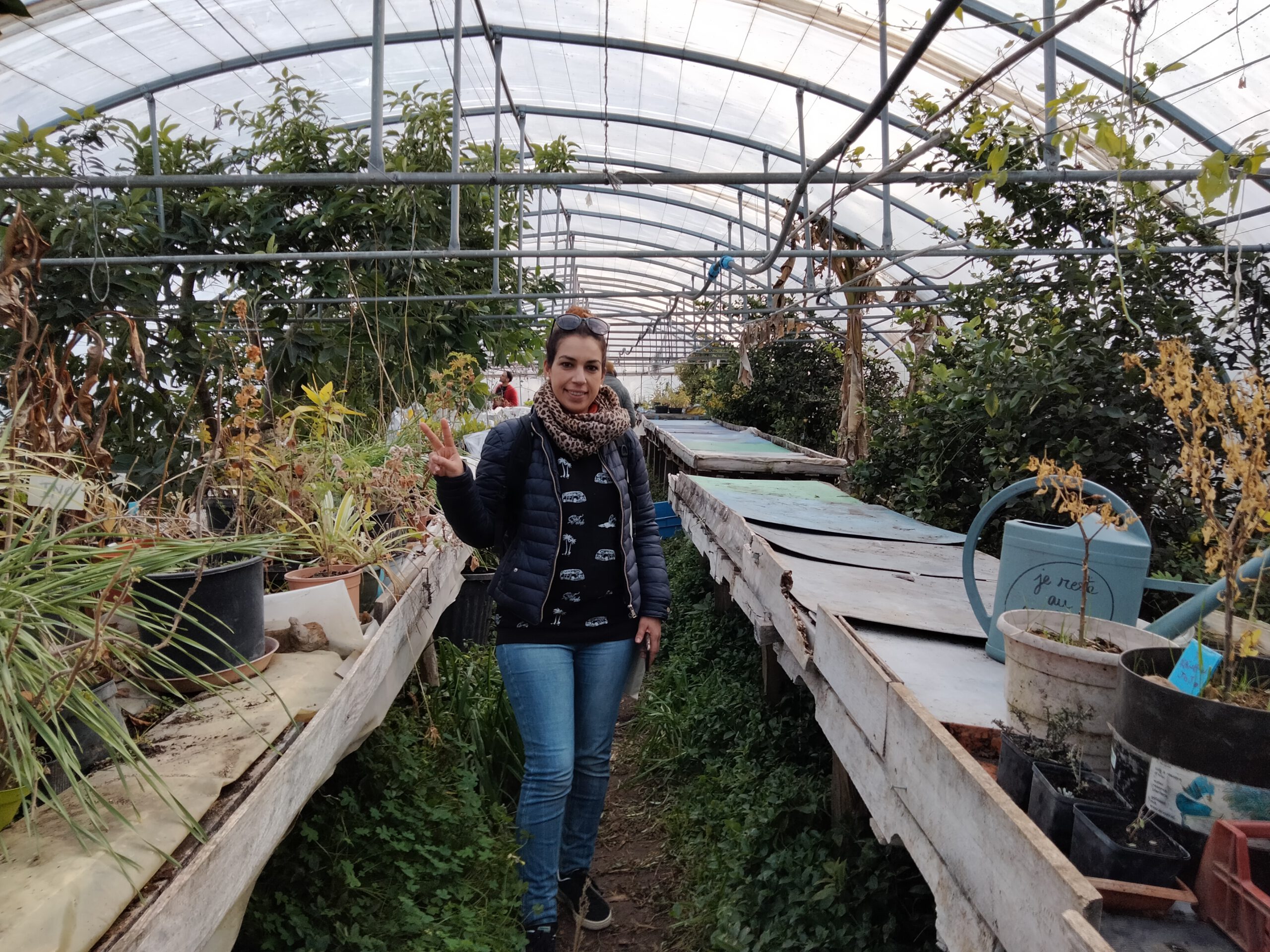
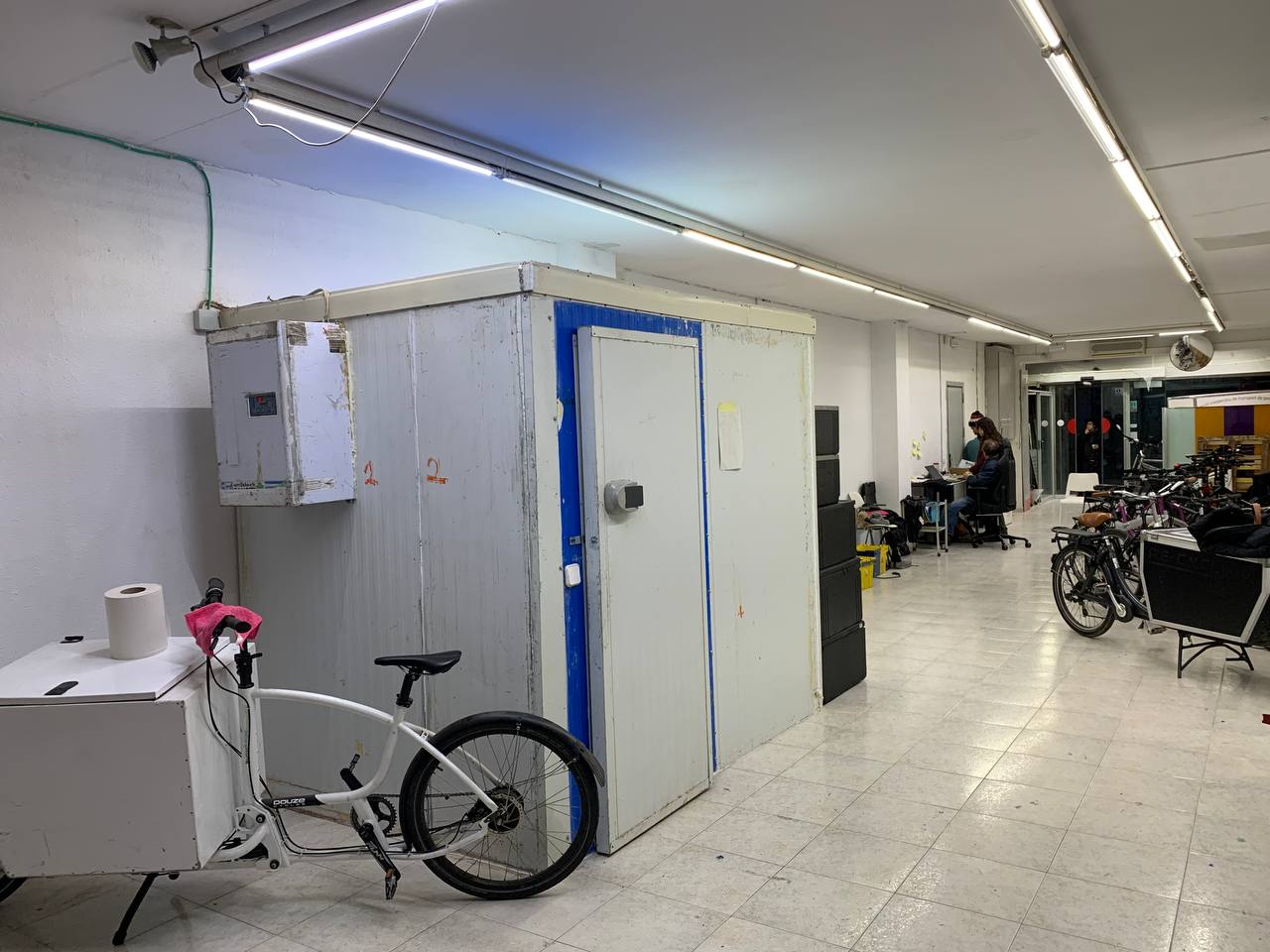
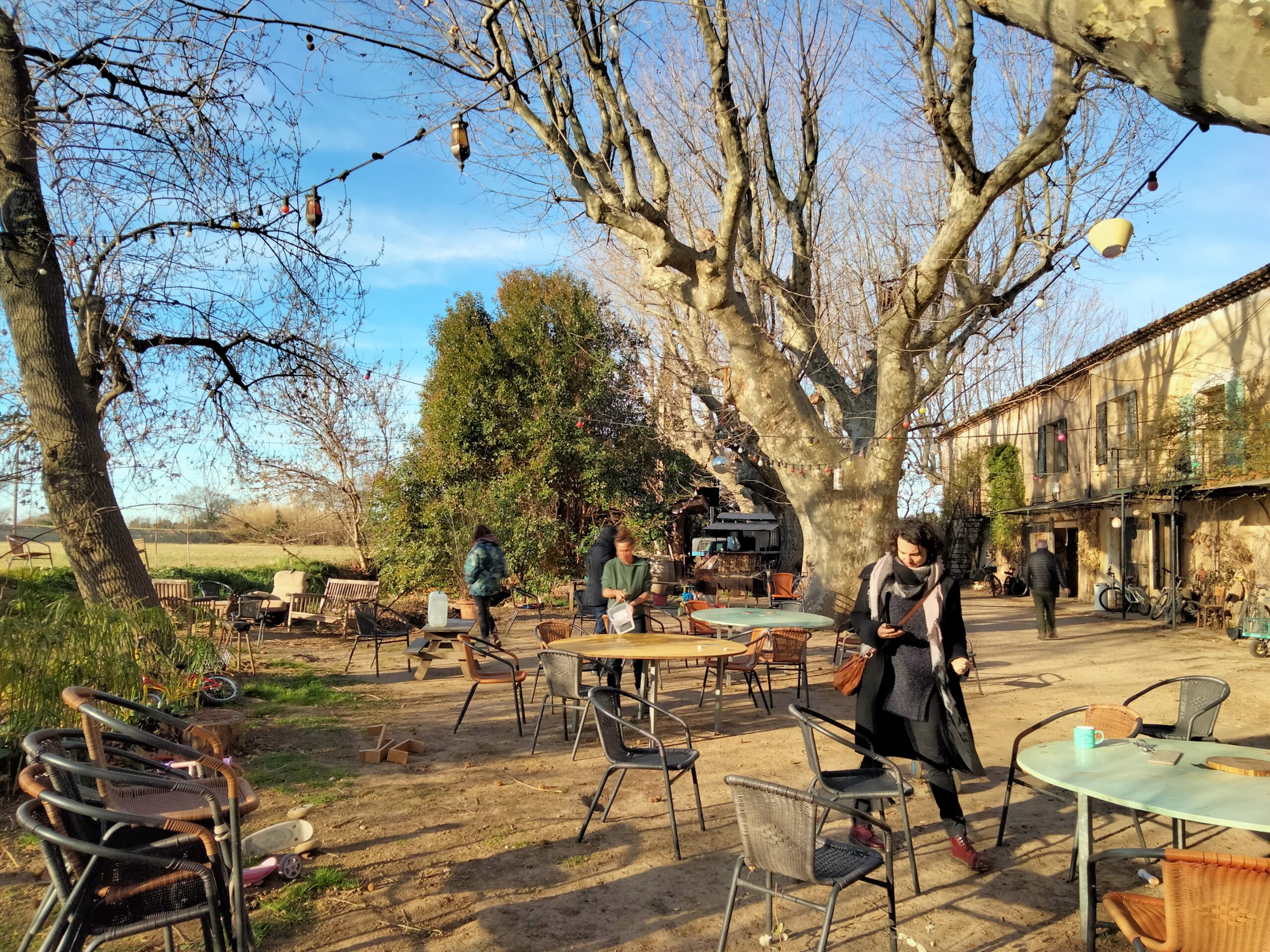
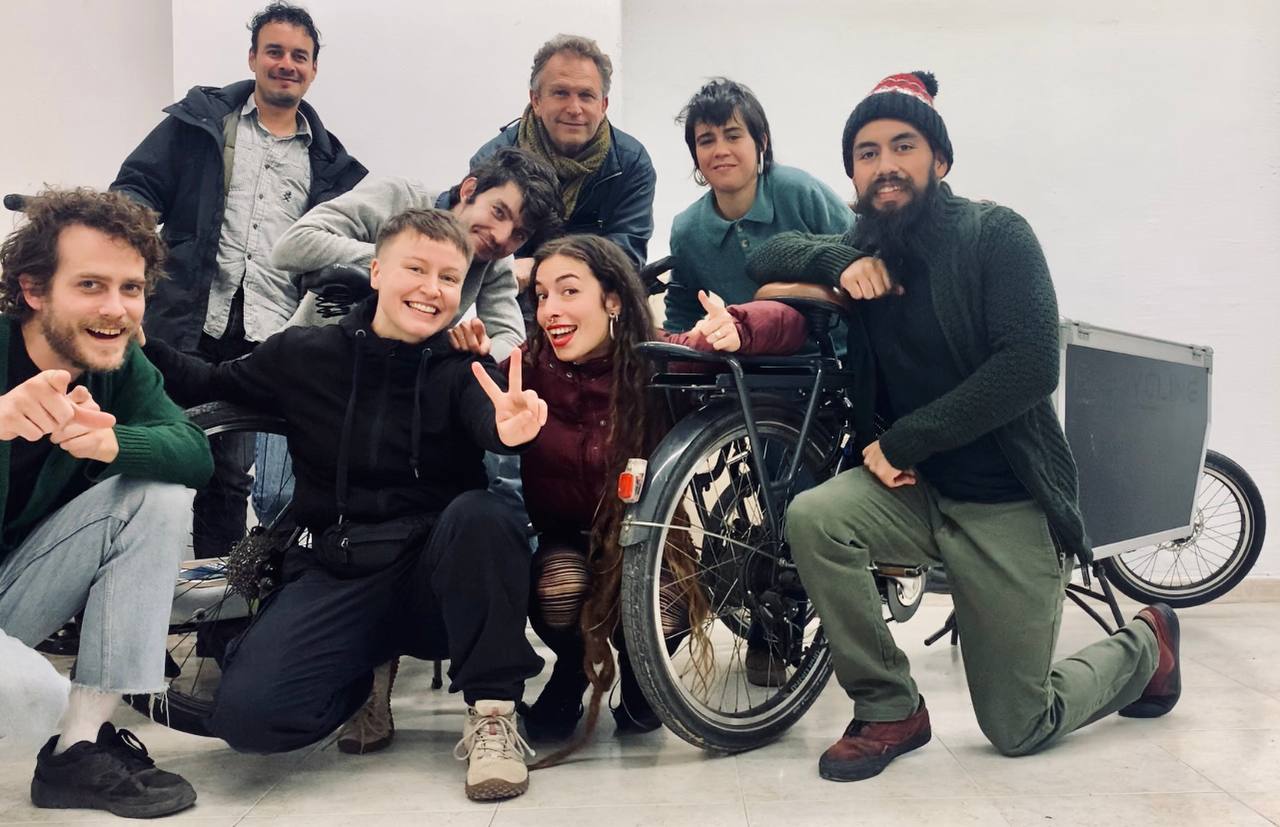
Photos by Nazaret Castro and Lotta Tenhunen
The second round of research stipends kicked off after the second encounter, with Najat Bassat and Nuria Soto having been also two of the speakers and workshop organizers working with other collectives and unions in the encounter. Najat Bassit and her comrade Ana Pinto from Jornaleras de Huelva en Lucha started working on a booklet on the practices of unionism in the fields of Huelva, where strawberry-picking day-laborers are facing multiple forms of economic, sexual, and racist violence. A study trip to Marsella, France was organized to work together with the collective CODETRAS which organizes in defense of agricultural workers’ rights. Nuria Soto, a founding member of ridersXderechos, started another situated research in which she takes on the new forms of algorithmic exploitation in platform work. As of May 2023, Bassat and Pinto’s booklet is freshly printed and soon to be presented, and Soto’s is to be expected early next autumn. There are two more research processes in the works.
Besides, the year was an important one for the Transnational Coordination Group. After the pandemic had put many of our travel plans on hold right after the founding of La Laboratoria, we were finally able to travel and meet in person in June 2022 in Mexico City. This encounter offered us the opportunity to visit the city and meet with other feminist groups active in the city, thanks to the collaboration with the bookshop La Volcana, the publishing house Bajo Tierra and the feminist collective Las Andrómedas. In addition to the many more informal conversations that a face-to-face meeting allows, we organized an intensive two-day seminar, which allowed us to deepen the debates, design a first coordinated research effort, and get inspired by the practices of other nodes and close collectives.
The international seminar was focused on the three lines of work shared by the different Laboratoria nodes ― feminist unionism, gender-based violence, and nonpunitive justice, and situated feminist research. The presentations and discussions served as a much-needed moment to evaluate, debate, reformulate and coordinate our territorial research projects and other lines of work in a way that would make the network more coherent and productive through the richness provided by applying the multiple points of view. The discussion around gender-based violence and non-punitive justice was particularly vivid and we decided to dedicate an international program of situated research to it. It is the first program that we are launching in a coordinated way among the different nodes, which is an important step in the consolidation of our common work.
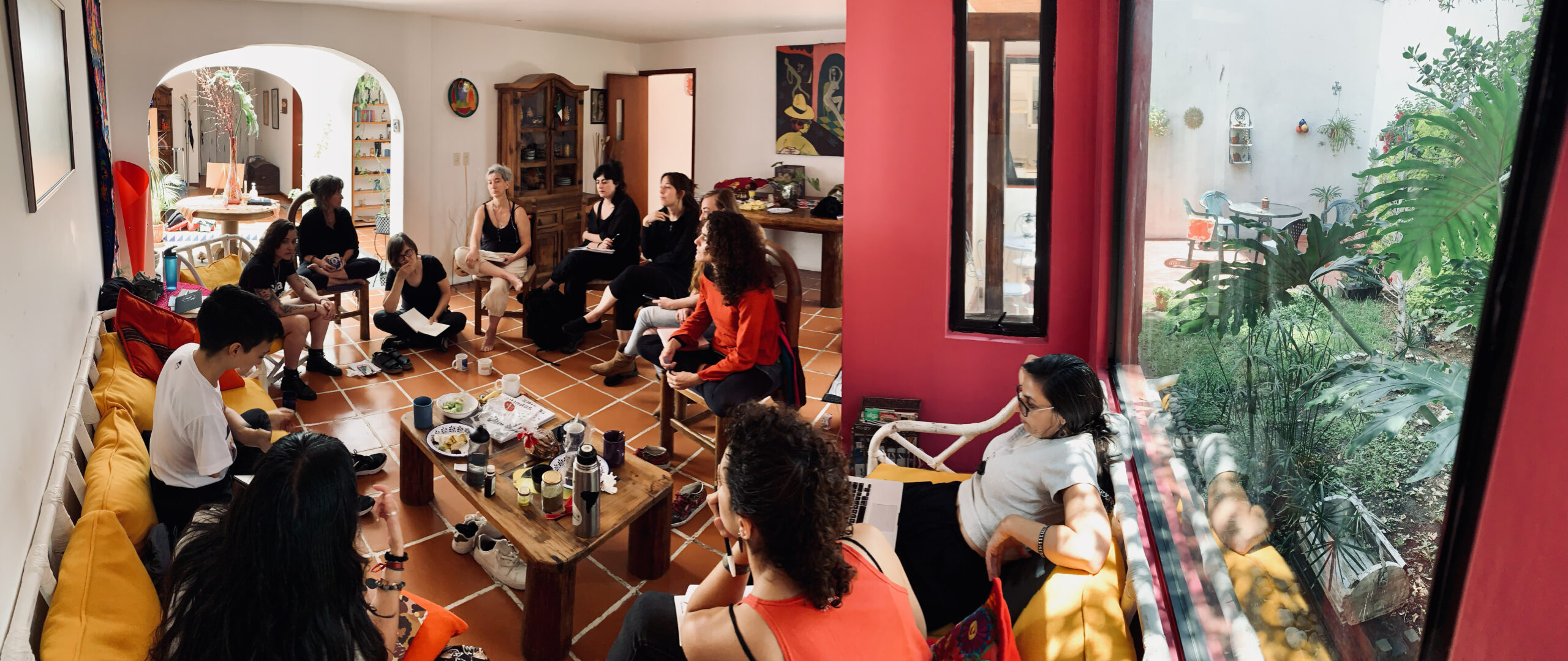
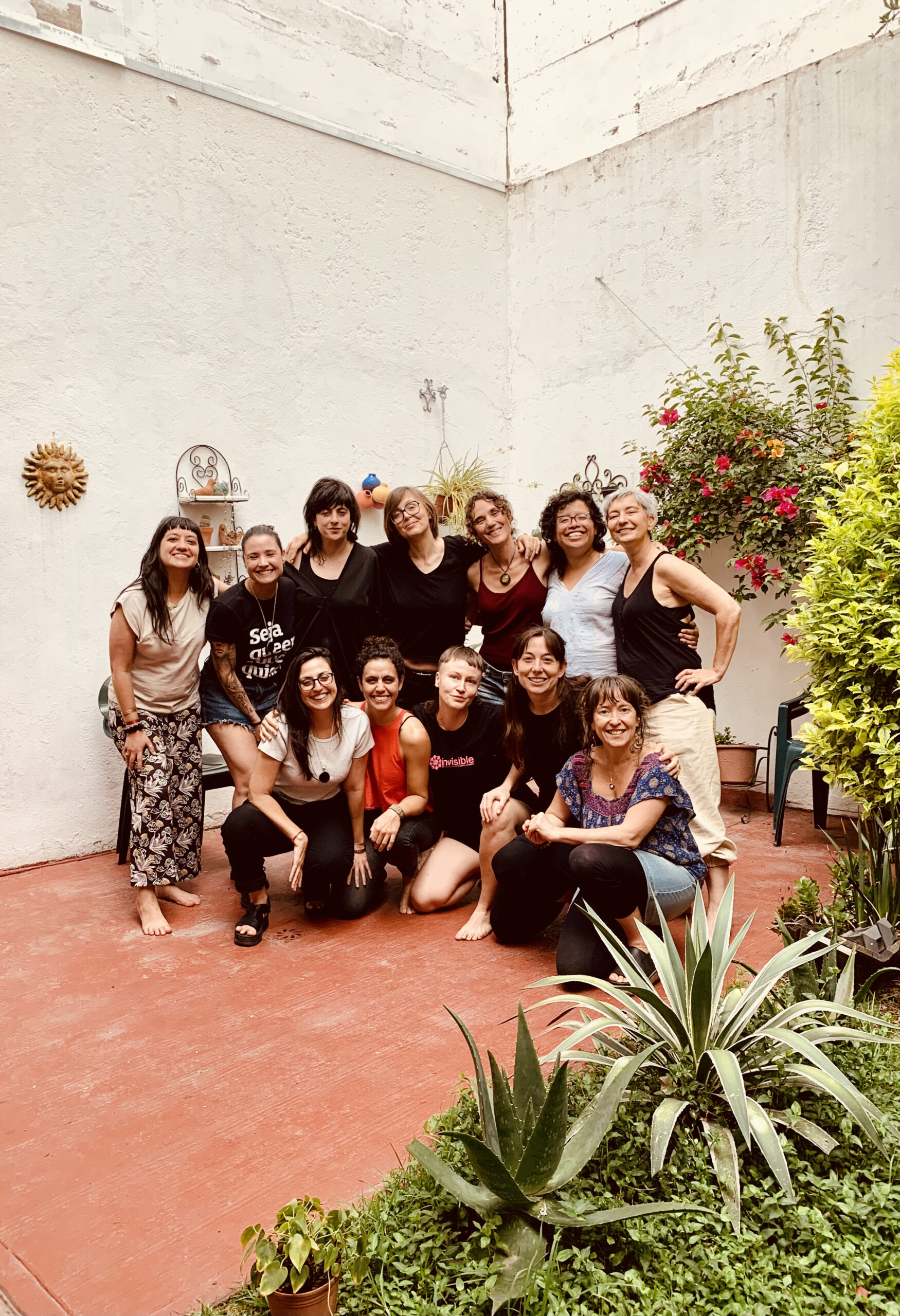
We also opened a new line of transnational online publications and invested resources to make our website multilingual in an effort to go beyond the Spanish-speaking world in which we mainly work. We translated all sections into Portuguese and English, thus reflecting the two main working languages of our research network along with Spanish. As of May 2023, some texts are already available as an initial test of the new multilingual feature. We do not aspire to have all the contents of our website in the three languages, but we do aim towards a heterolingual horizon where there are more and more materials in more and more languages.
During our second full year of activity, we have deepened international dialogues, not only with the creation of international mentoring groups for all our situated research but also with other initiatives such as interviews, “conversations in movement” and the deepening of transnational grassroots alliances. One of the inspirations that Madrid node took home from the Mexico seminar was organizing a School for Popular Feminism. Following the thought and practice of Mujeres de Frente, who since then have joined the Quito node, we wanted to create a space for reading, thinking, and writing together. This activity became a reality in early 2023. We also had a precious opportunity to welcome a Chilean feminist and ex representative Alondra Carrillo and organize a wholesome program during her stay in Madrid. This encounter permitted analyzing the massive global mobilizations of 8th of March of the last years together with the question of strategies for the production of institutional change.
In addition to the strengthening of relations among the different nodes of La Laboratoria and the collaborations with Chilean feminism, Mujeres de Frente (Ecuador), In/movilidad en las Américas and Common Ecologies, we established new relationships with feminist and eco-social research, communication and popular pedagogy groups in Europe and Latin America, such as El Observatorio de Plataformas and Flor del Guanto (Ecuador); Revista Amazonas (Latin America); Terra! (Italy), Carro de Combate, Revista Pikara and El Salto (Spain); and Common Ecologies (Germany/Austria).
Throughout the year we have also continued, strengthened, and deepened our collaboration with Museo Nacional Centro de Arte Reina Sofía, Rosa-Luxemburg-Stiftung, and Foundation for Arts Initiatives, valuing the continuity, feedback and mutual enjoyment that sustained institutional relations bring.
What’s next?
The ongoing year 2023 brings many of the processes that started last year into fruition. We are expecting to tour with new two new booklets on practices of feminist unionism and see the other two being finished. We will see the first collective publication by the Transnational Coordination Group focusing on patriarchal and economic violence, feminist self-defense, and practices of restorative justice. We will present new collaborations that have resulted in podcasts and stage monologues. Our plan is to keep going.



